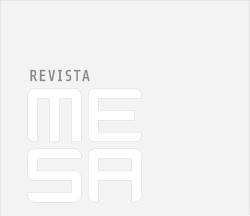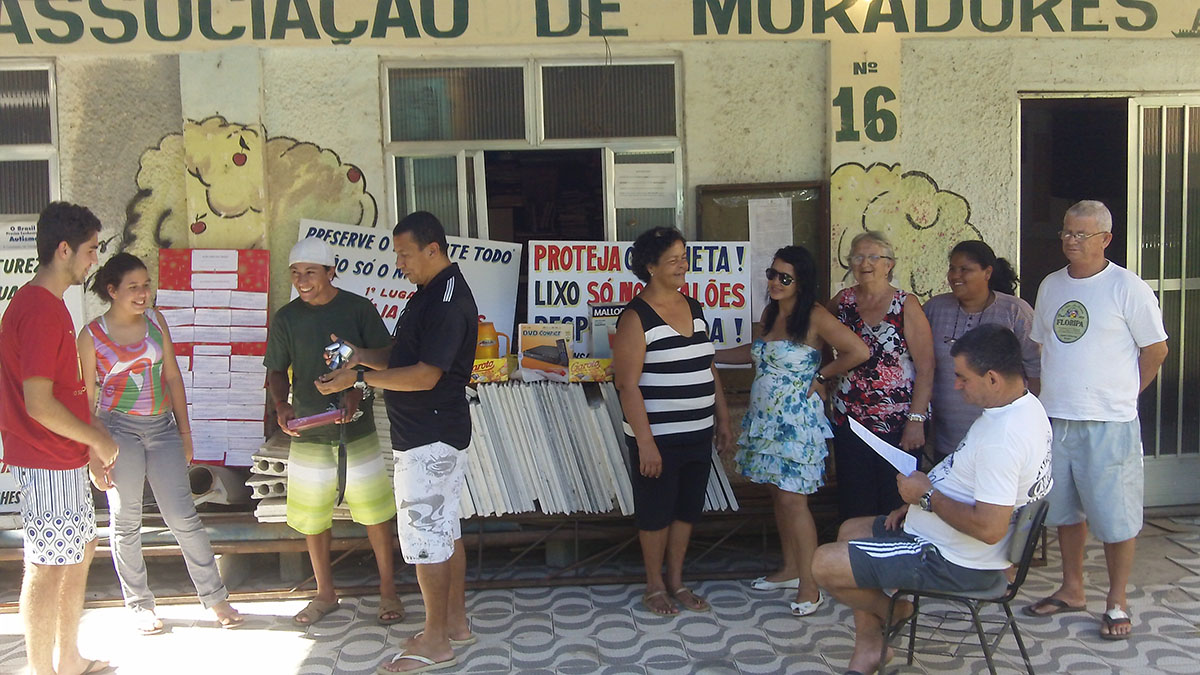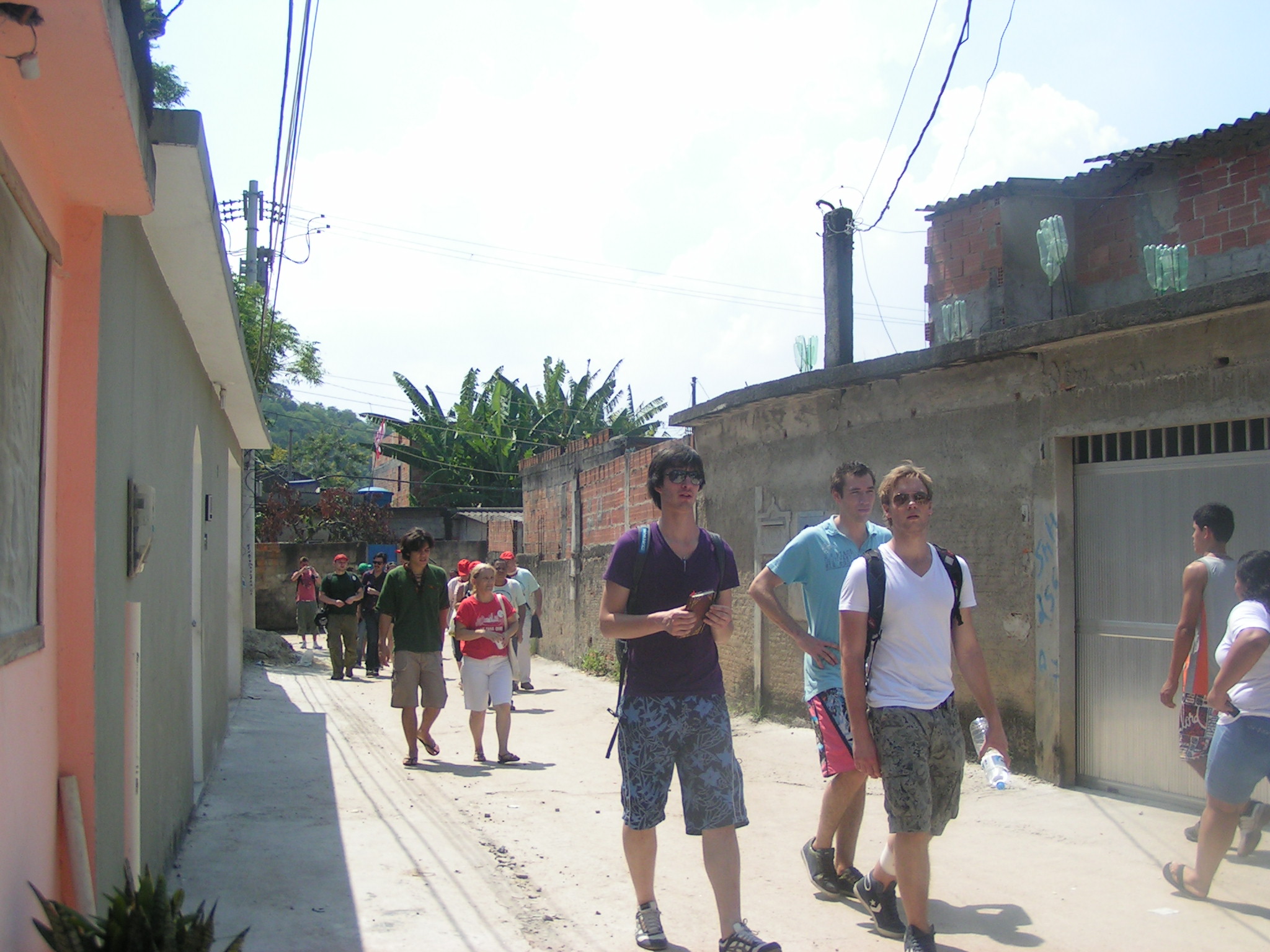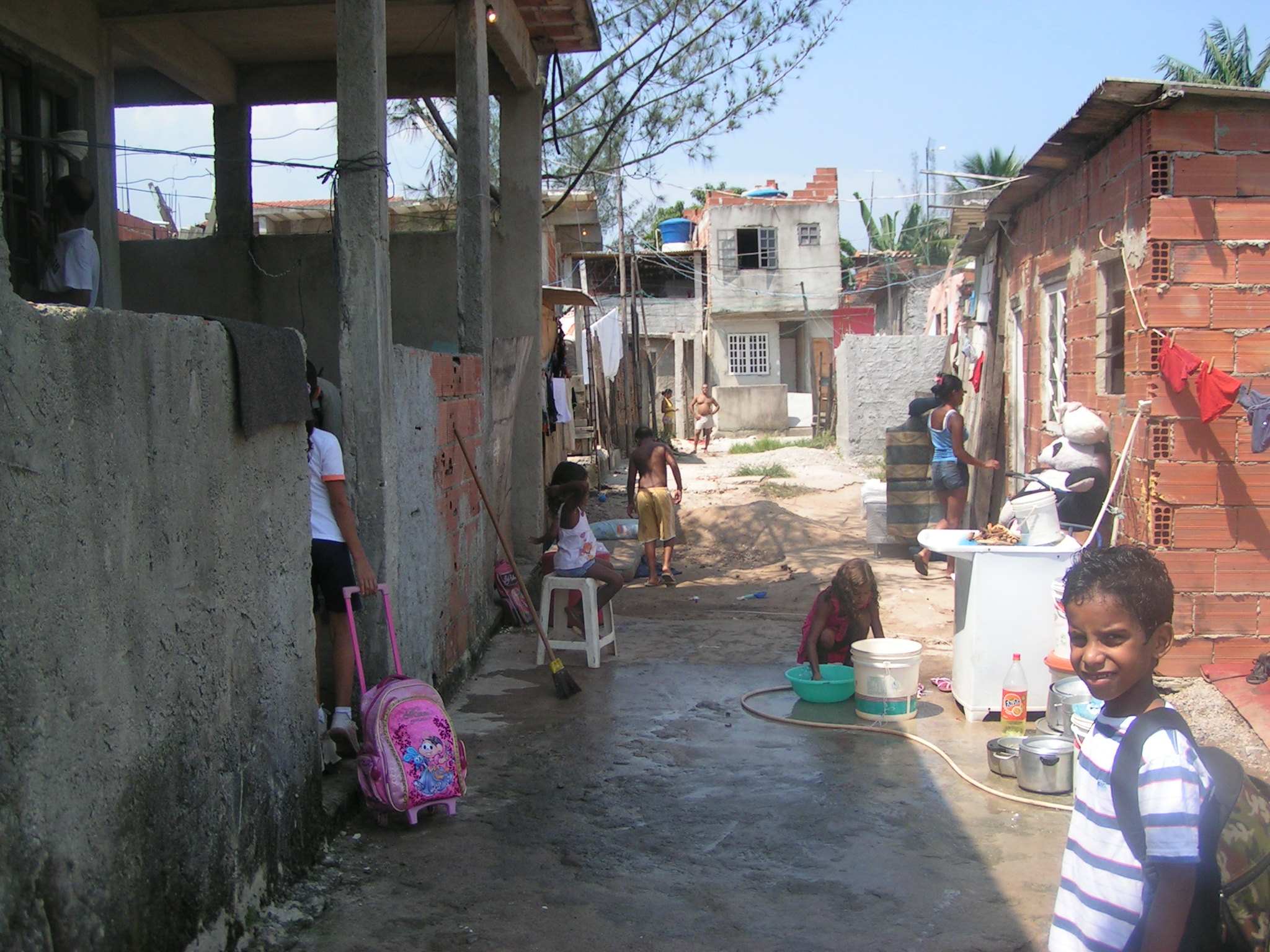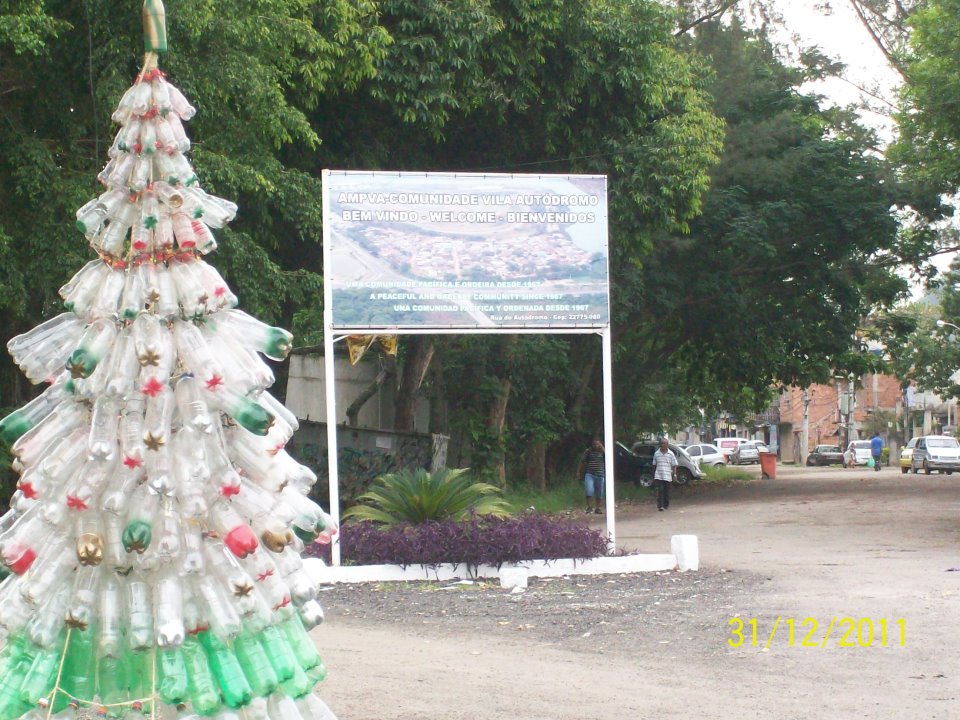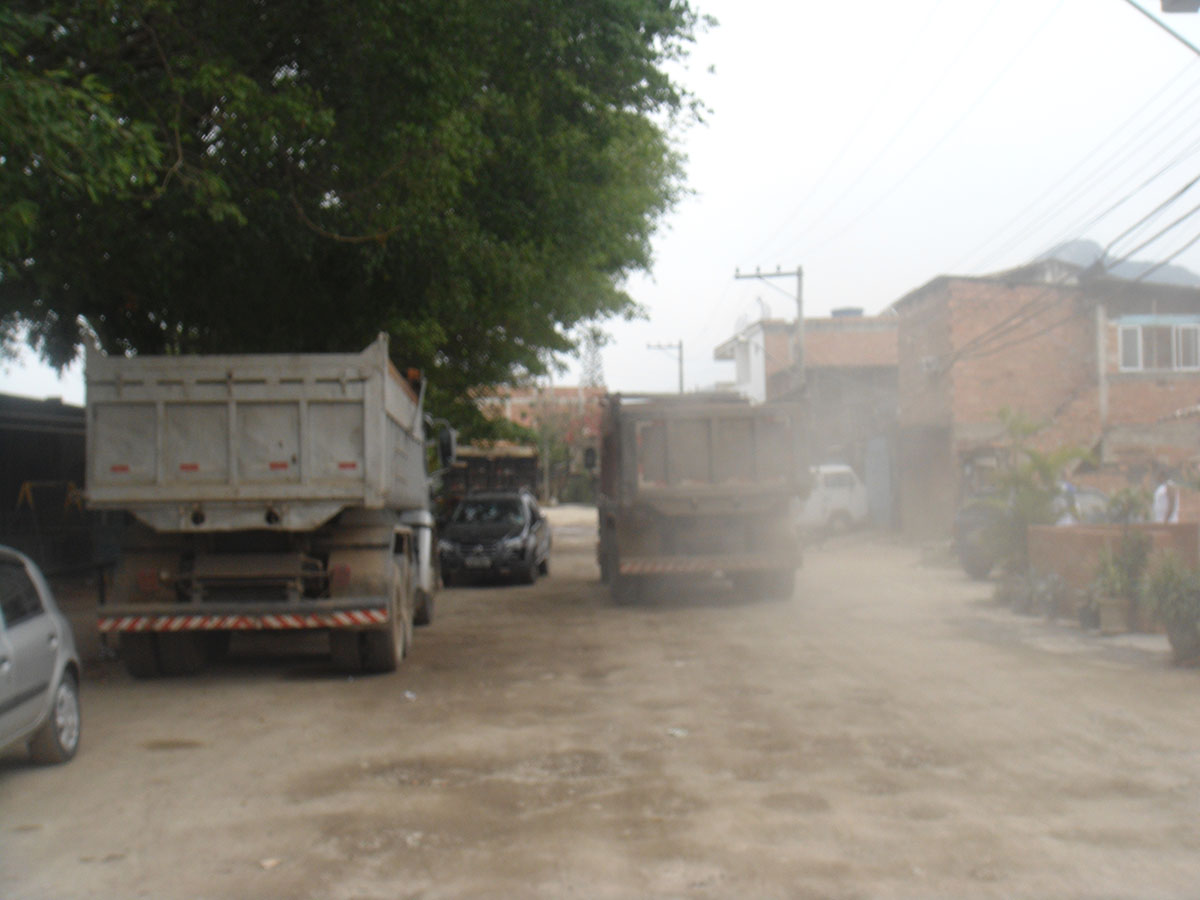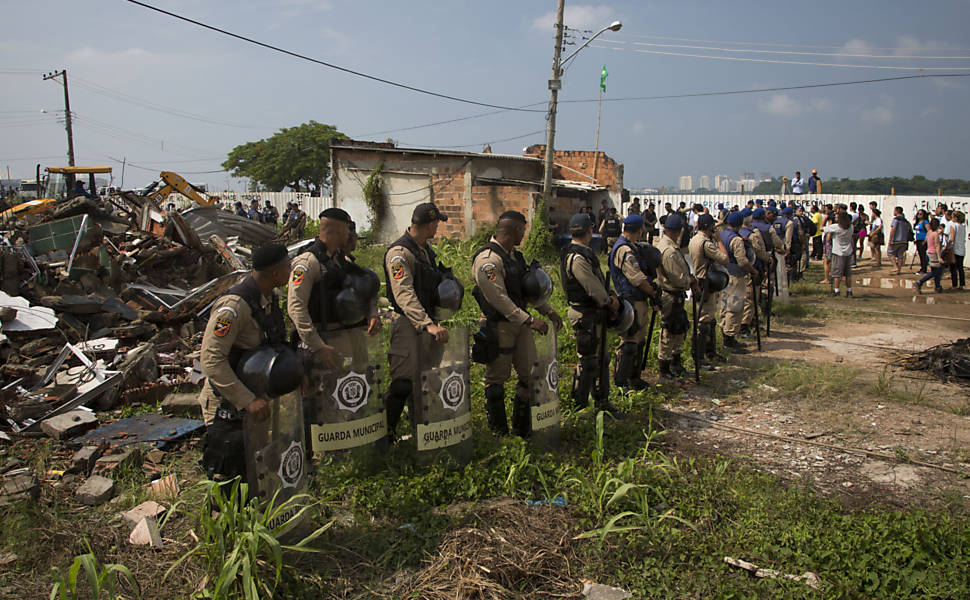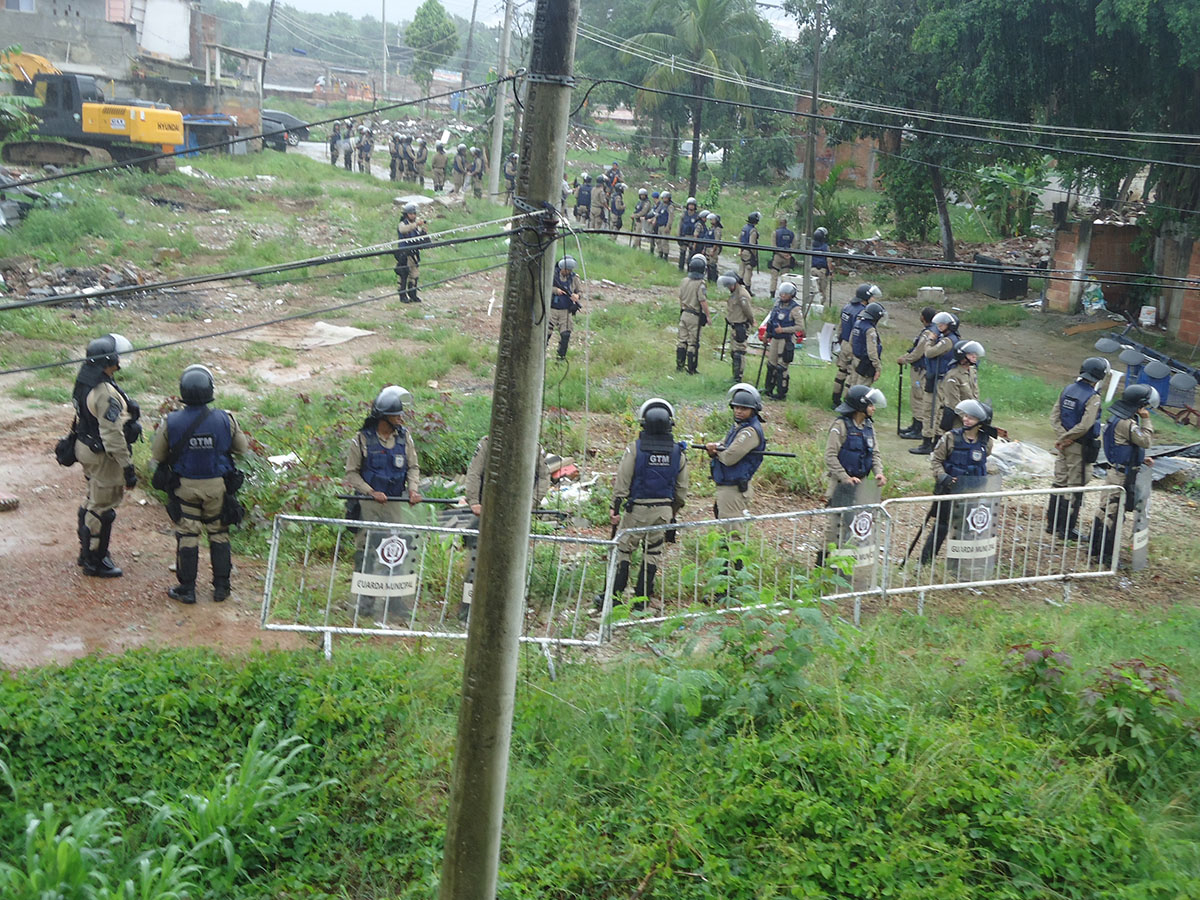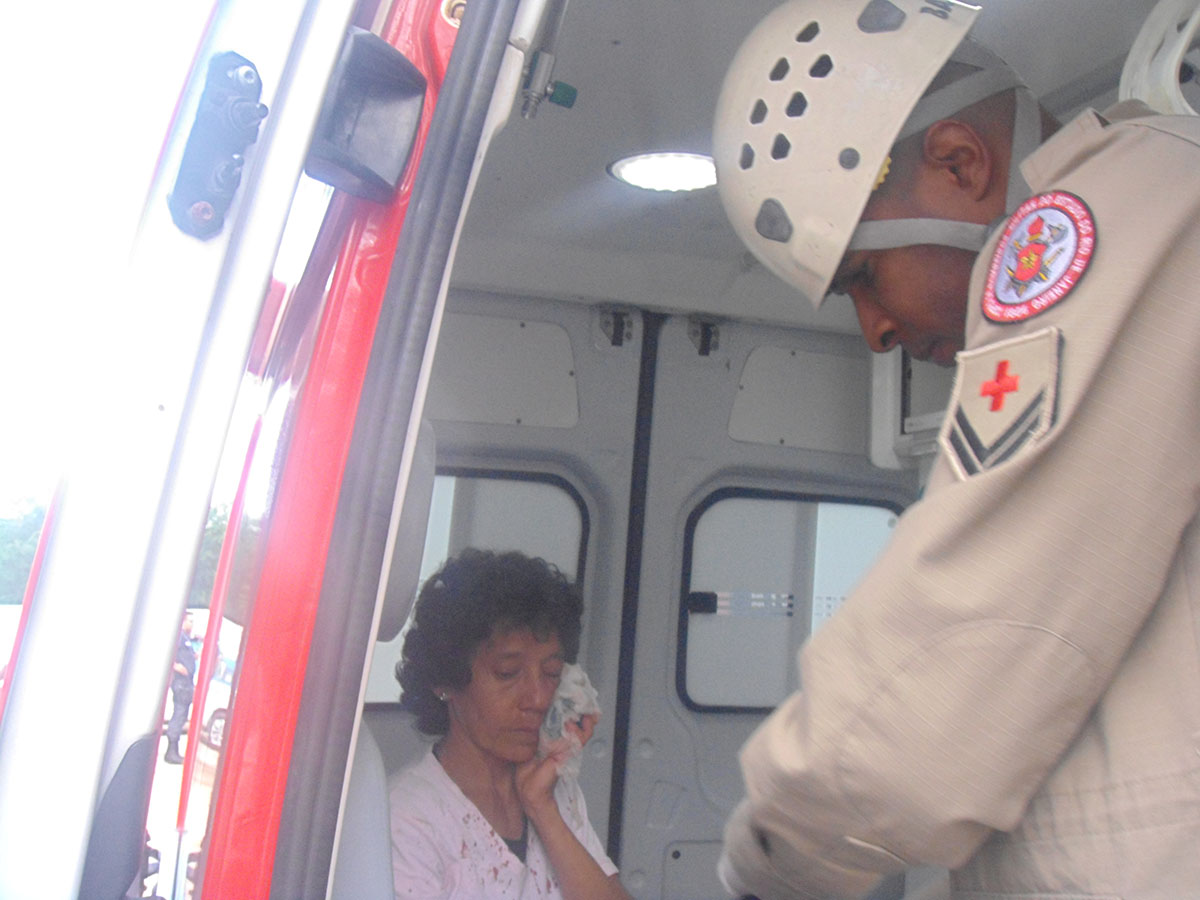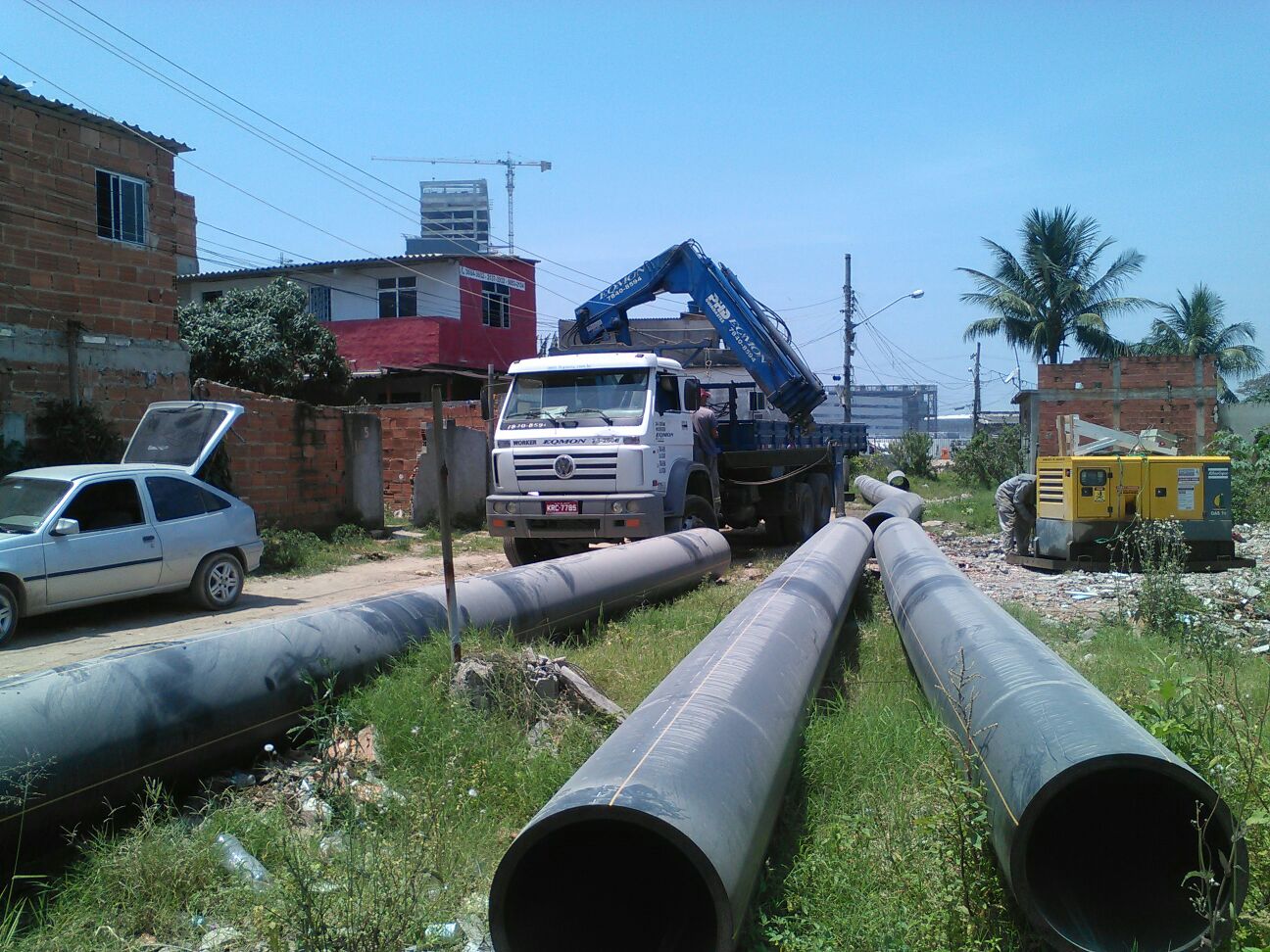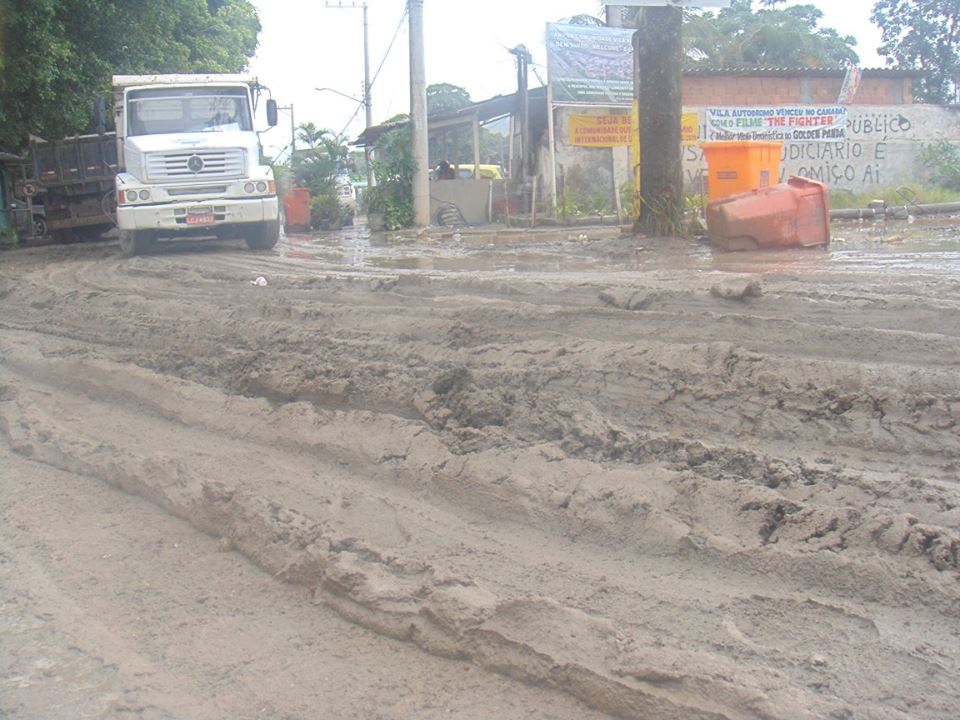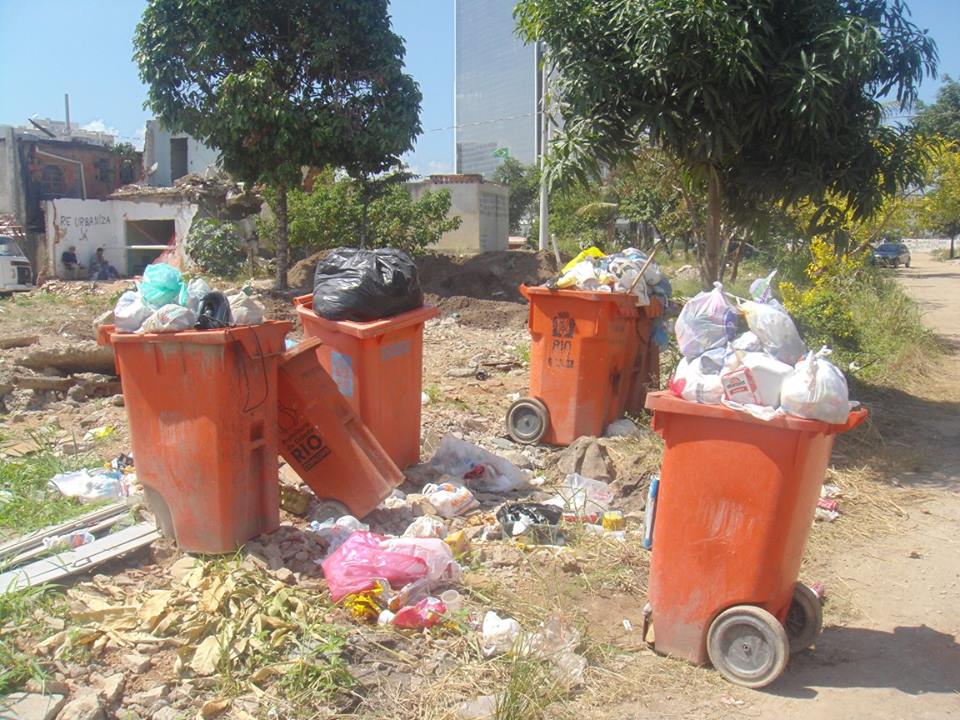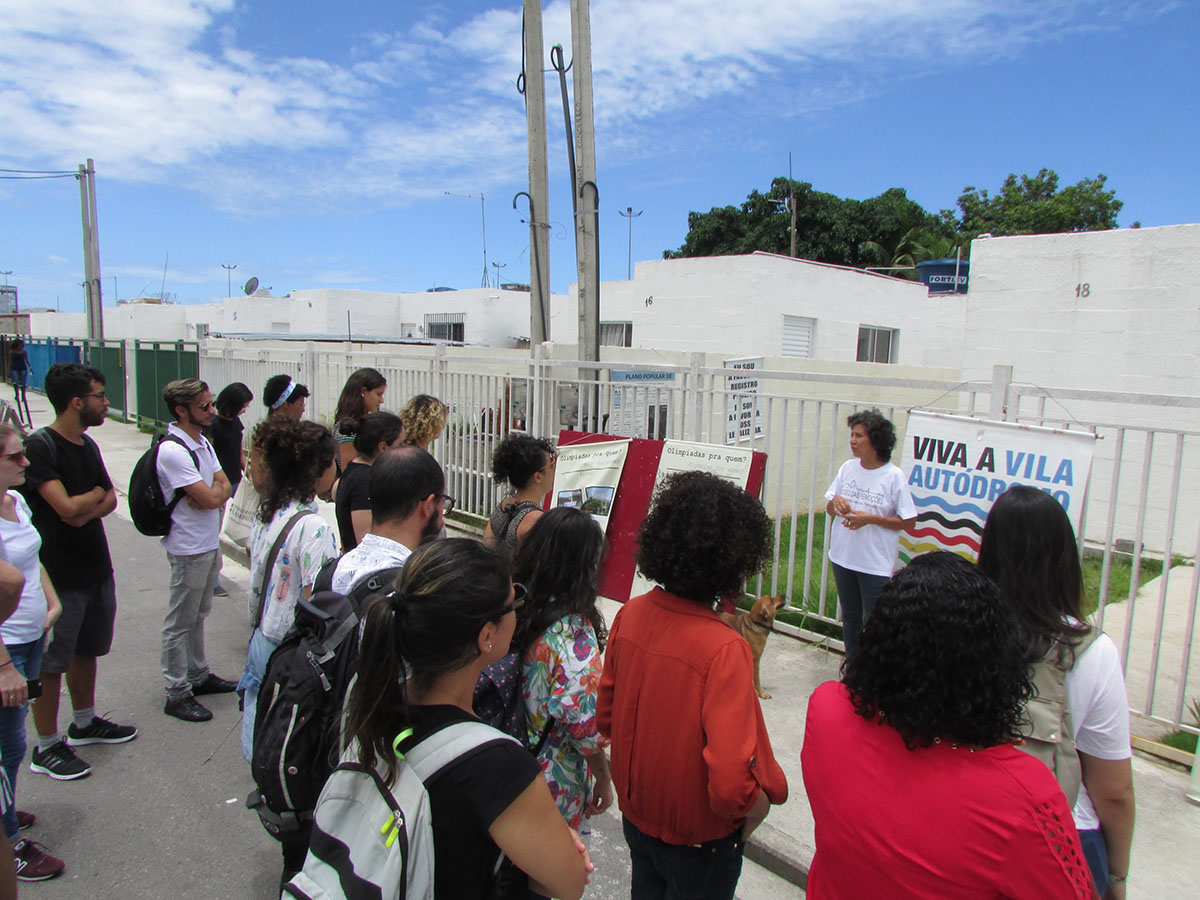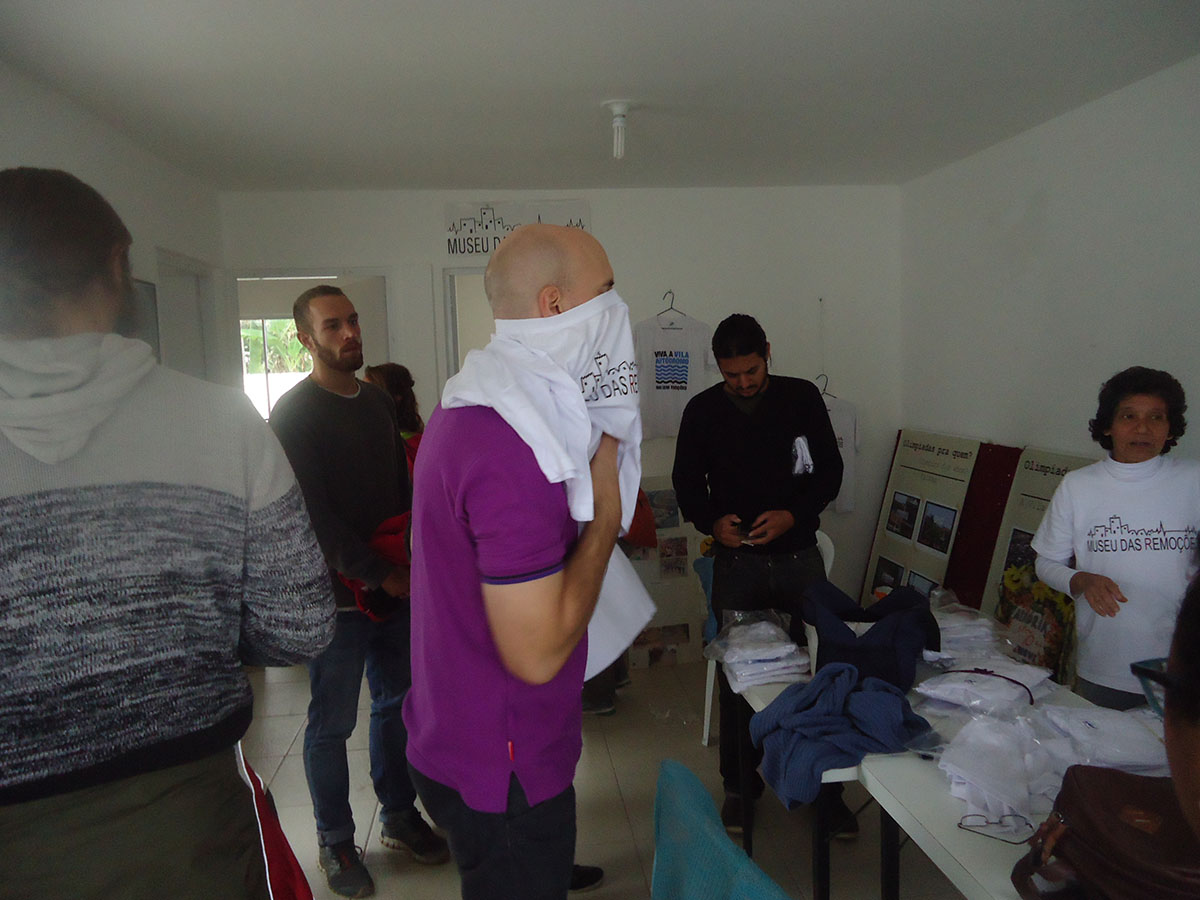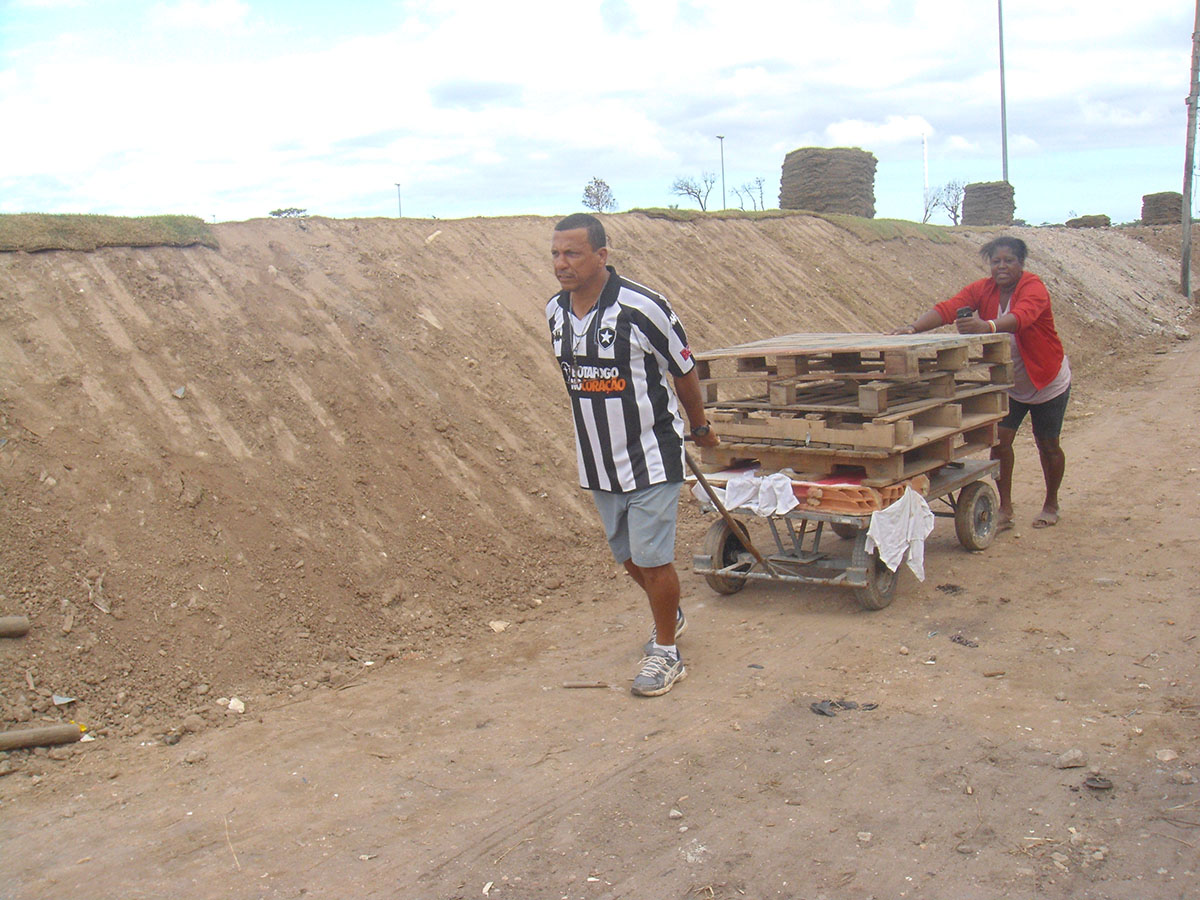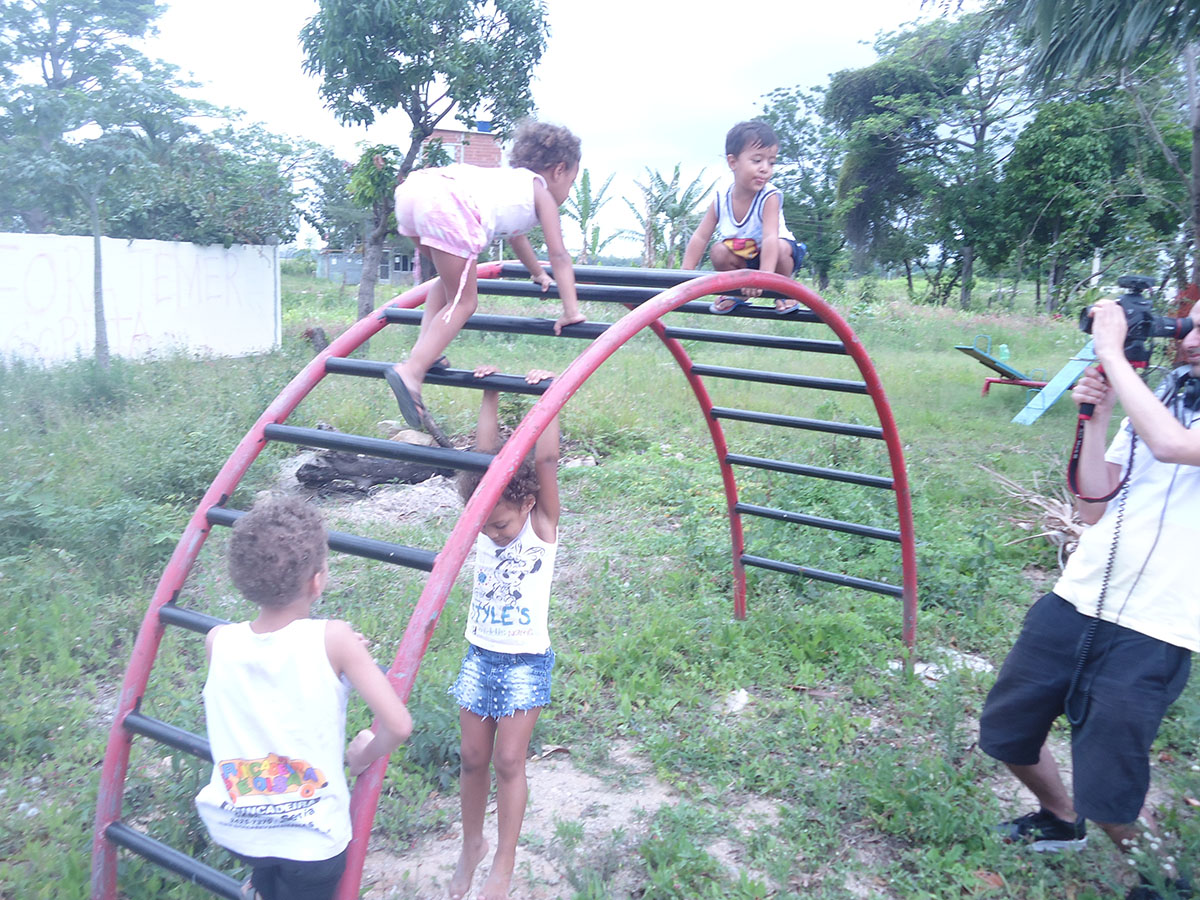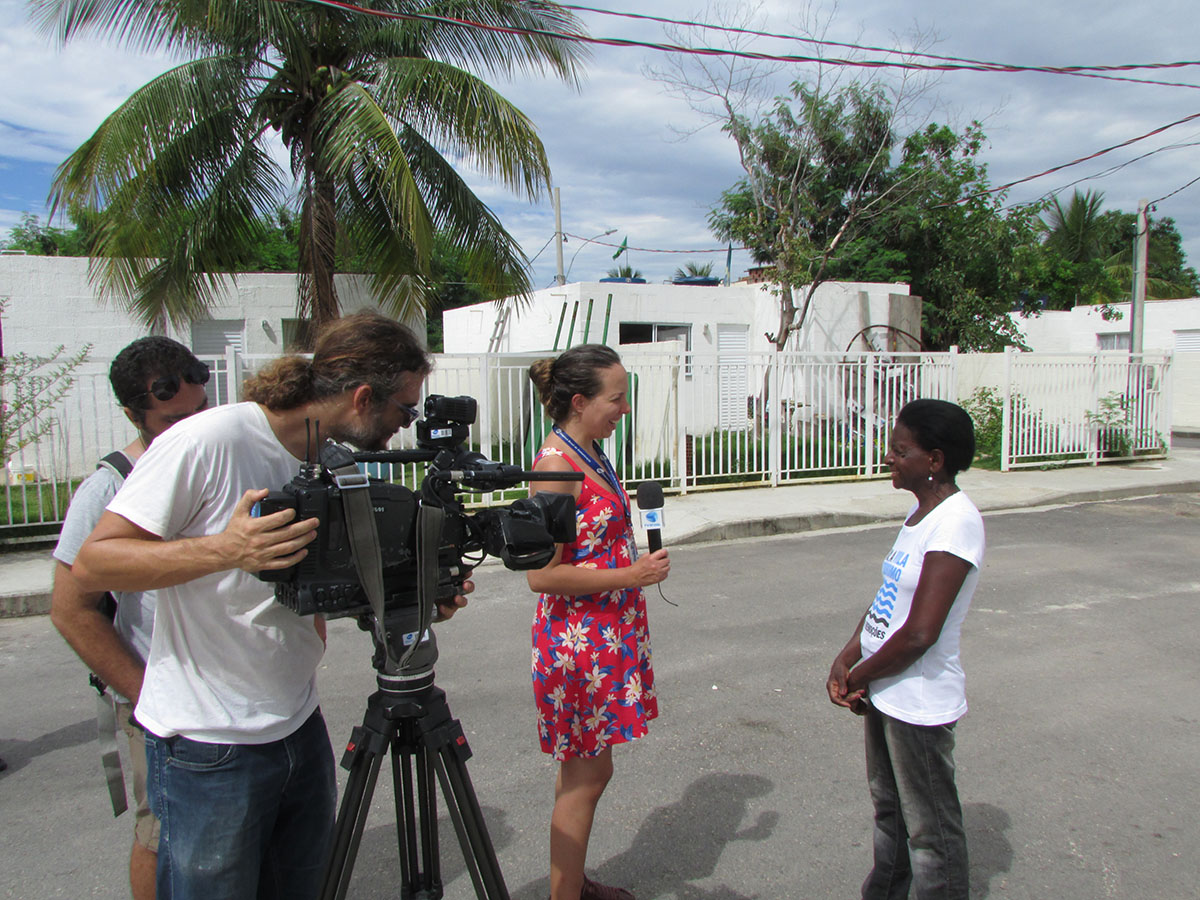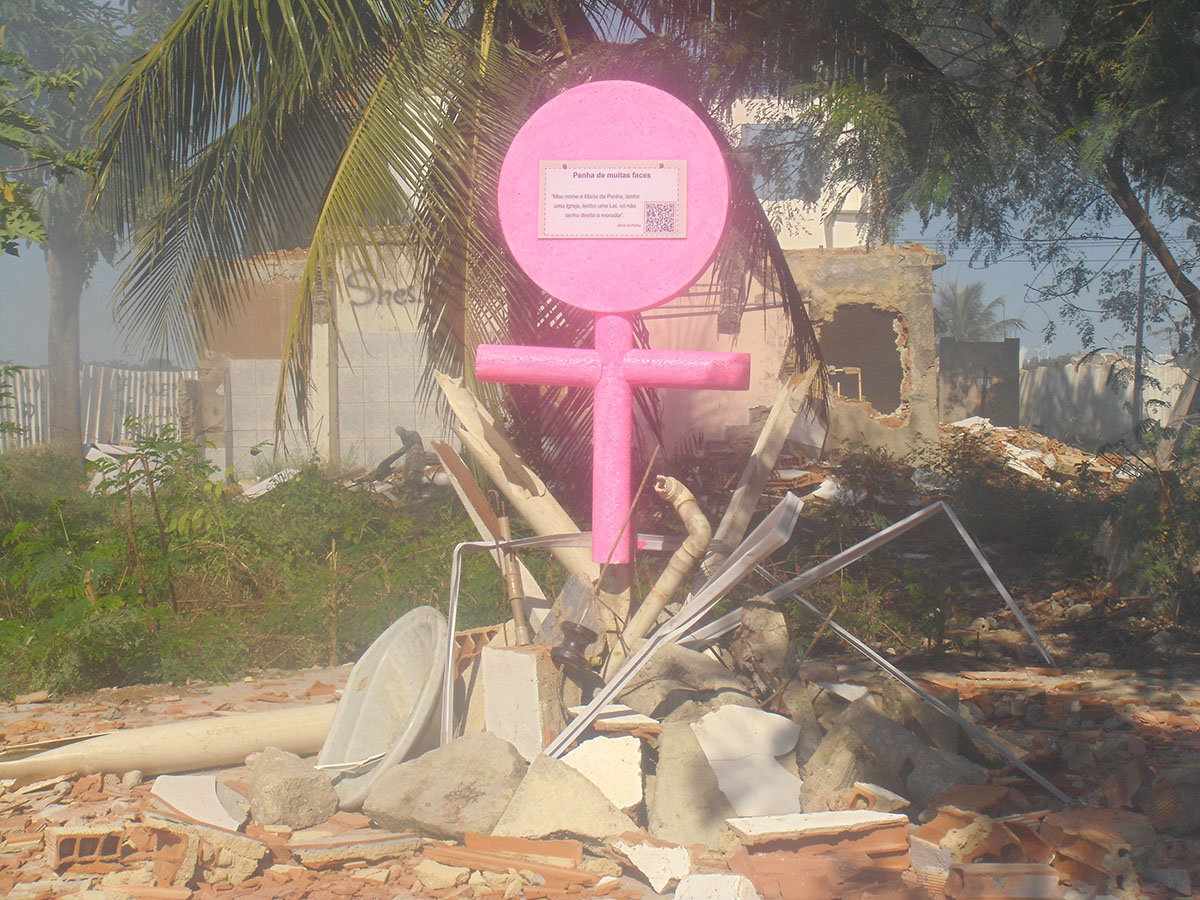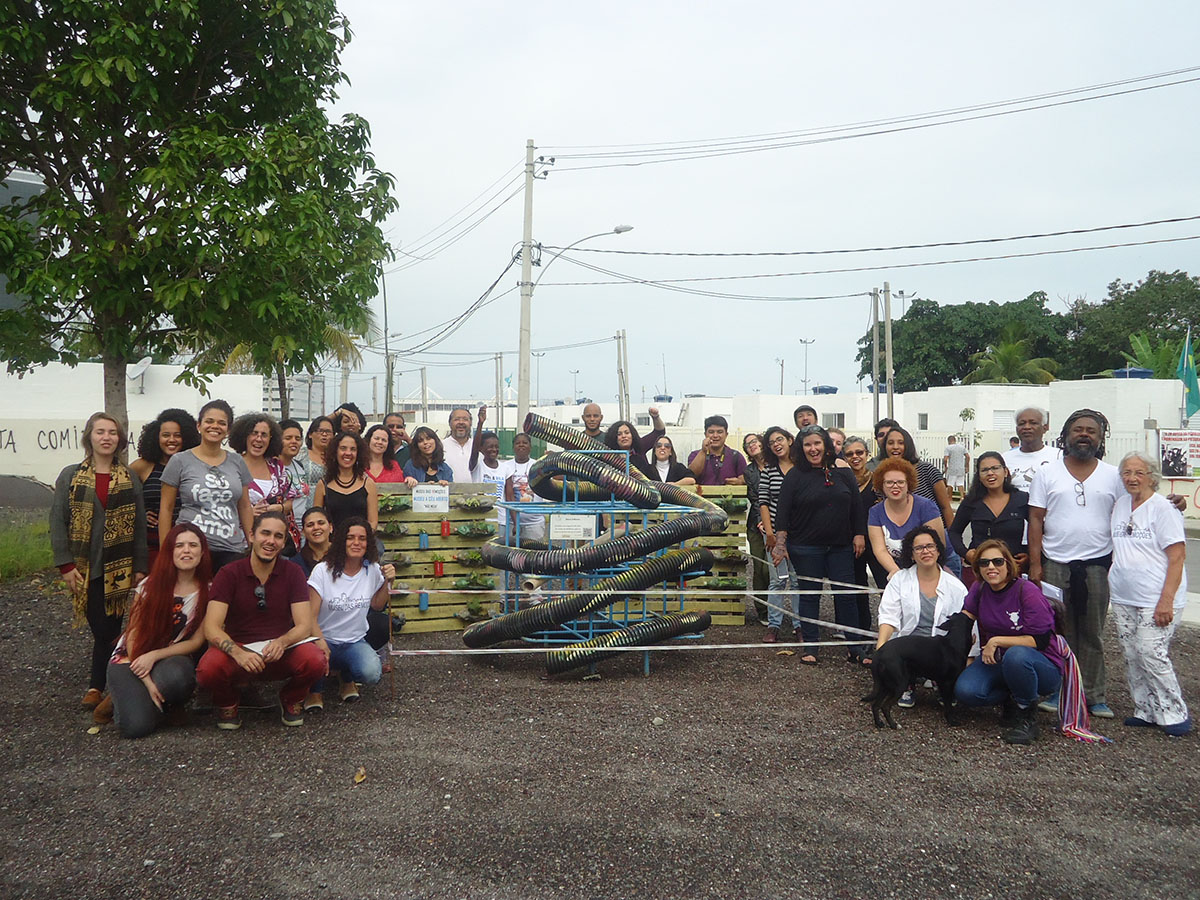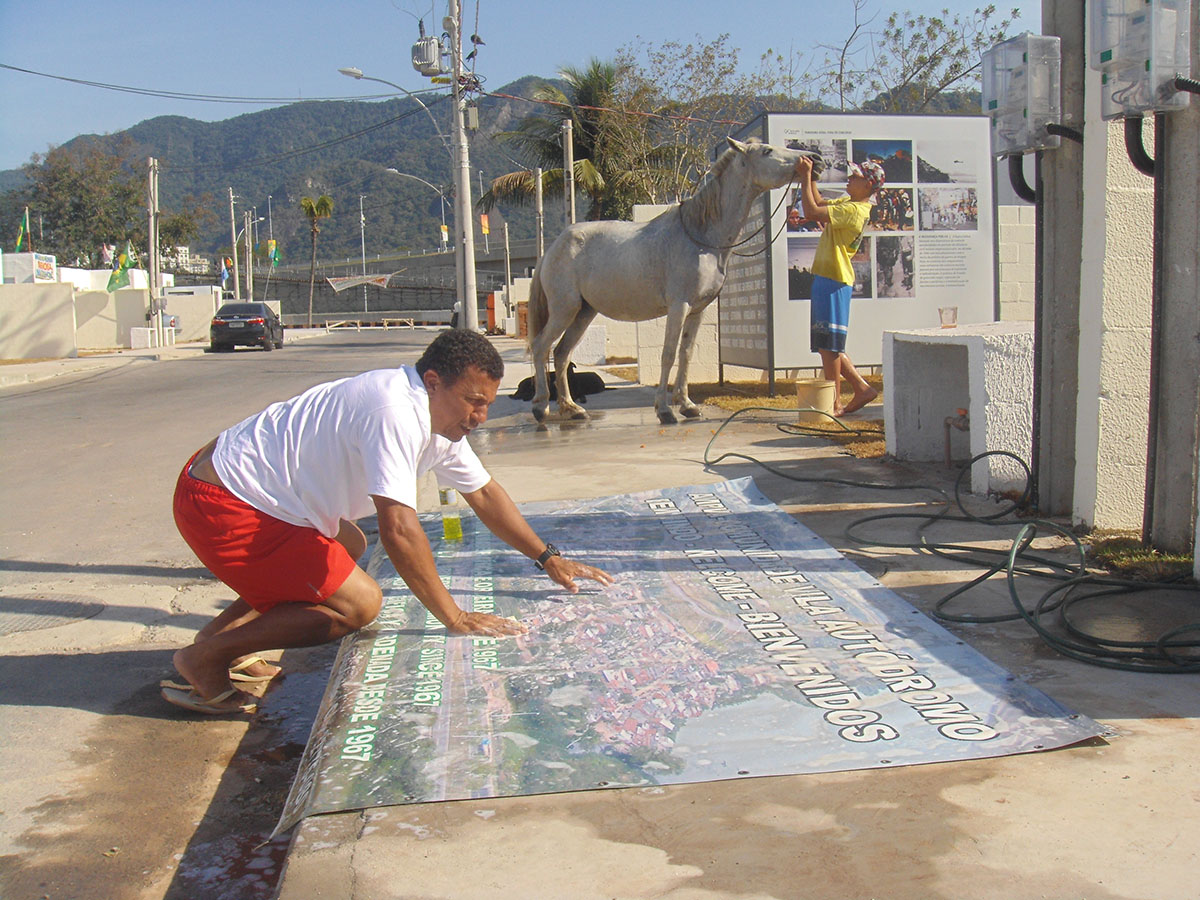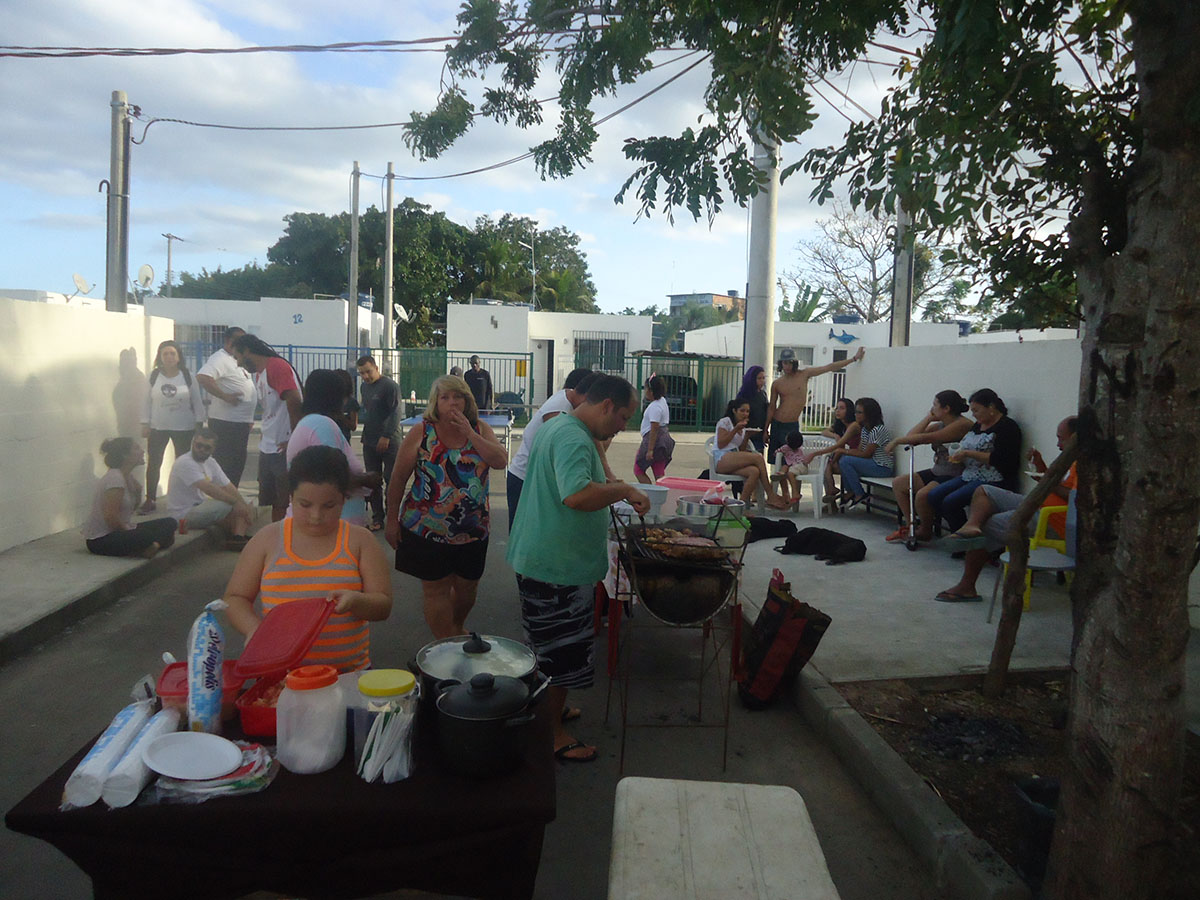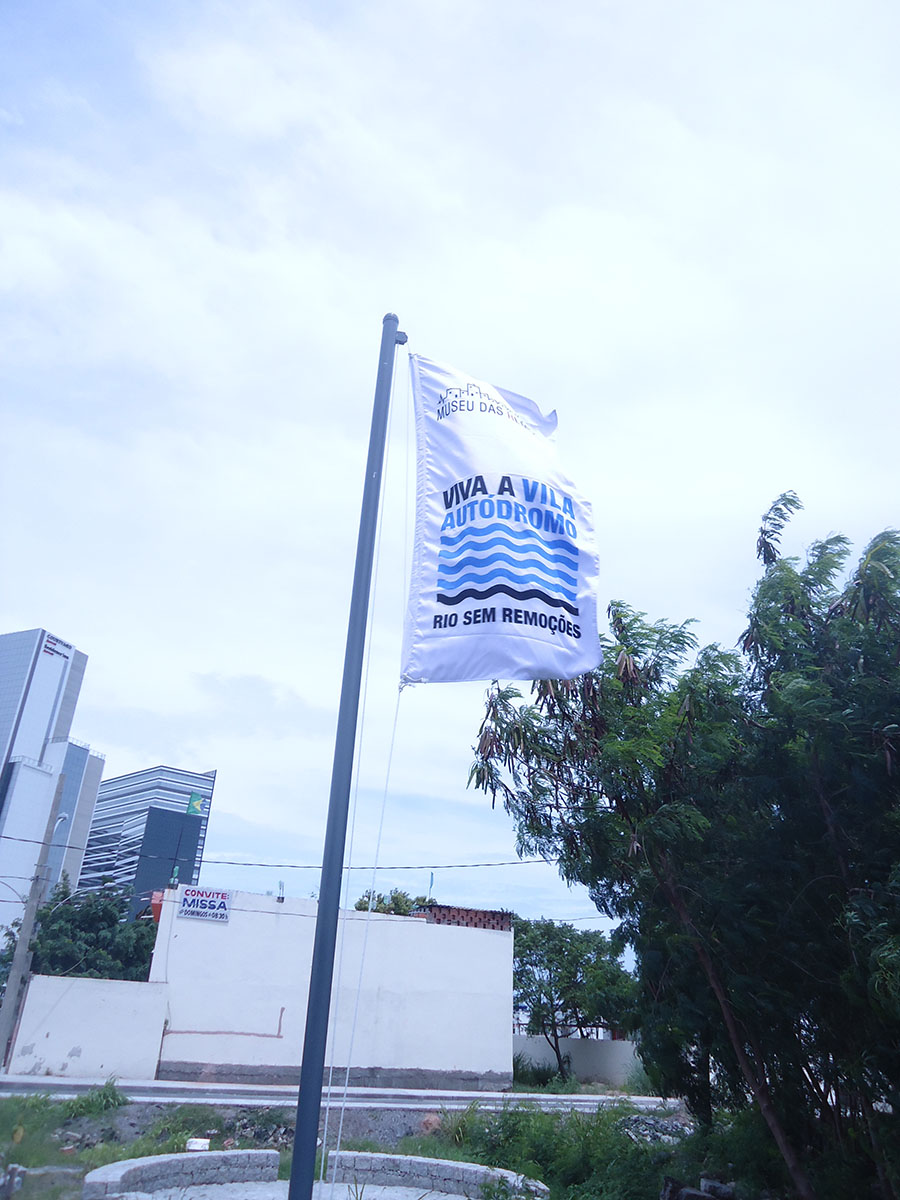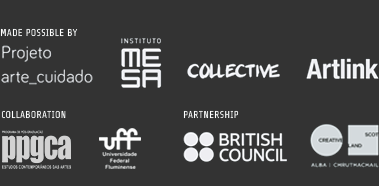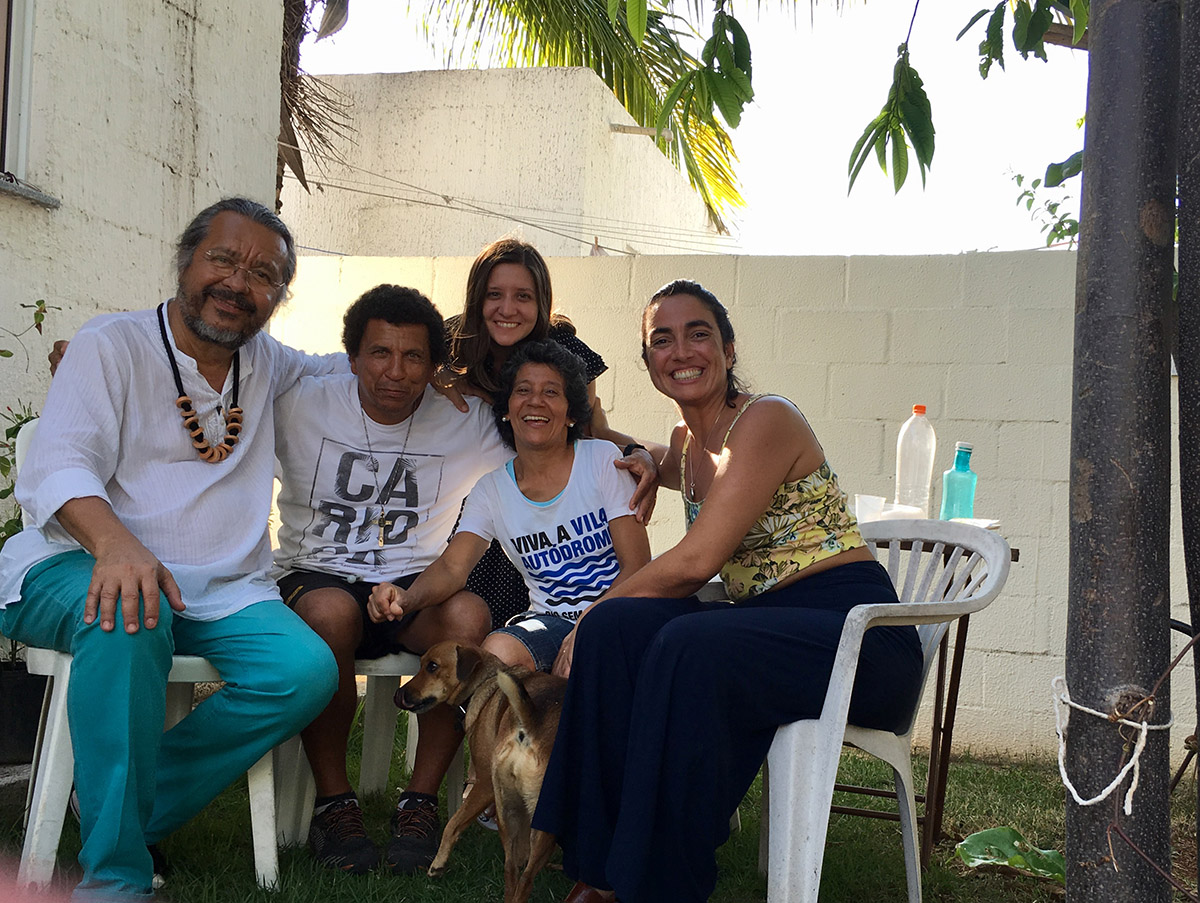
Maria da Penha Macena, Luiz Claudio Silva, Luiza Andrade, Izabela Pucu and Mário Chagas, December 17th 2017. At the home of Dona Penha and Luiz Claudio Silva.
To Live Sharing Care (or the Vila Autódromo and the Museum of Removals as Laboratories for a New Democracy)
A dialogue with Maria da Penha Macena, Luiz Claudio Silva and Luiza Andrade
Interview, introduction and editing: Izabela Pucu and Mário Chagas
Audio / video recording: Luiza Andrade
Transcription: Talita Prestes Vieira
Slide Shows: Luiz Claudio Silva
Introduction
It was a sunny afternoon on Saturday, December 16, 2017, just five days before the official beginning of summer. Together, we set off for Vila Autódromo. As it was Saturday, the day of creation,1 as the poet Vinicius de Morais would say, it seemed an ideal day for us to talk freely with a family whose role was decisive in the process of resisting the forced removals of the Vila Autódromo families imposed by the local government of Rio de Janeiro. Maria da Penha Macena, Luiz Claudio da Silva and Nathalia Macena da Silva, daughter of the couple were to receive us in their house. Theirs was one of twenty remaining homes, a standardized house built by the municipality, after the removal of much of the community from a territory that had previously been inhabited by more than 600 families.
On the way we let them know that we would be about twenty minutes late. When we arrived, we knocked on the door of the house, and called their names. Only the dogs on the street, around the house, and of the neighbors answered us. We started calling out Luiz Claudio and Nathalia’s names without success. Dona Penha, as she is also known, does not use a cell phone. Saturday afternoon, with an unremitting heat beginning to creep up on us; it was then that the daughter of Sandra Maria de Souza Teixeira, another important and combative leader in the Vila Autódromo struggle, arrived to tell us: “My mother is waiting for you.” We were greeted at Sandra Maria’s house who explained to us: Penha and Luiz took advantage of our delay to go to the supermarket.” It was Saturday after all, both a day of creation and work. “But they’re already on the way.” She had been asked to do the “honors of the house”. We savored an ice cold juice made from beaten lemon grass, harvested in Sandra’s backyard. We chatted generally about the removals, prompted by the presence of dogs that had somehow imposed themselves on the surroundings, since their lives were also linked to the removal of Vila Autódromo families, when many animals, like people, were left without their houses.
Penha and Luiz arrived. We moved house. Once again we were well cared for and hydrated with mango juice, and we shared a snack that we had brought. Dona Penha explained that her daughter Nathalia would not participate as she had a work commitment and then invited us to her backyard: a grassy area with trees and good shade, tables, chairs and a mobile barbecue built from a wheelbarrow.2
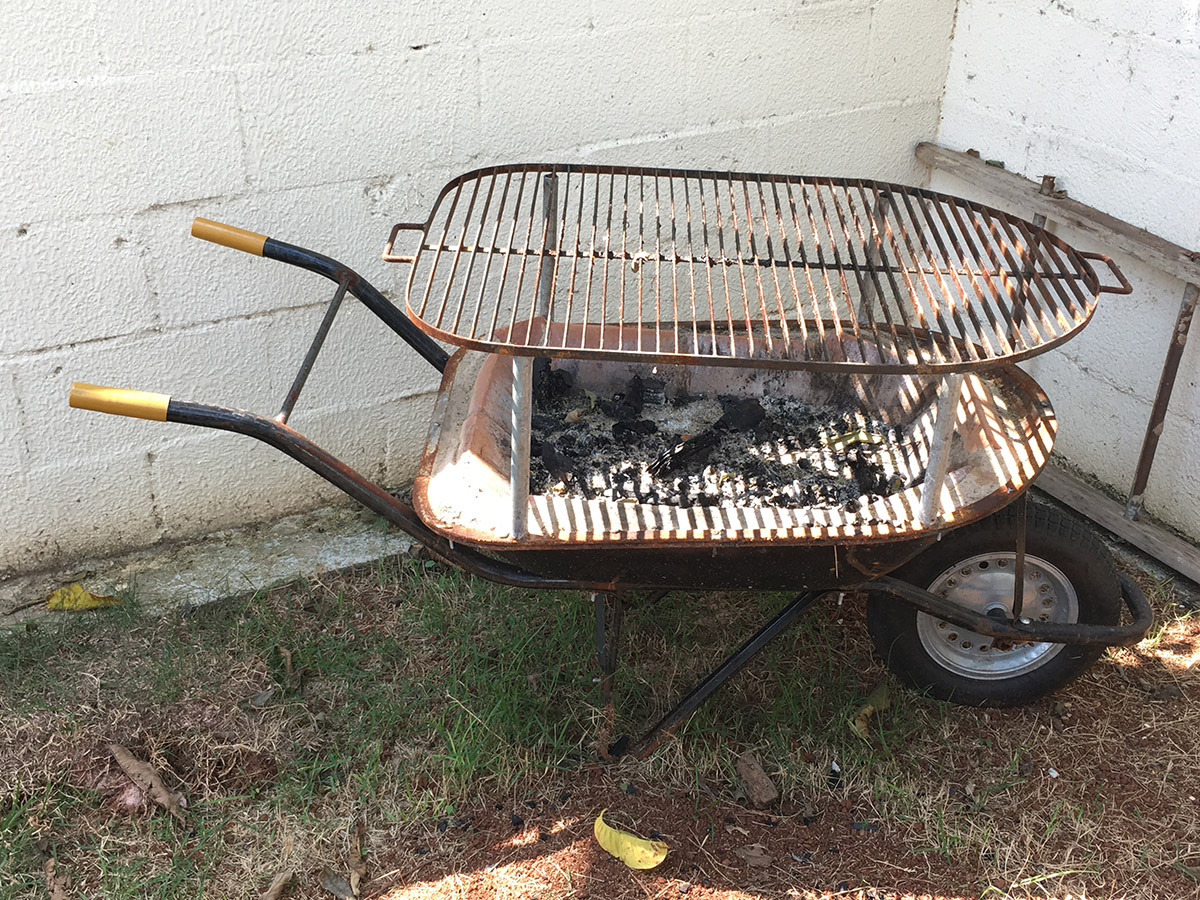
Fig 1. Mobile barbecue. Built by the artist Guga Ferraz in the context of the project Céu Aberto [Open Sky] supported by the Goethe Institute. Photo: Izabela Pucu.
There on that Saturday was also Luiza Andrade – a young supporter of the struggle of the residents of Vila Autodromo and the Museum of Removals – who would take care of registering our discussion in photographs, audio and video. Dona Penha, on seeing Luiza wrapped her in a tight embrace and smiling, hurried to say: “Luiza is also my daughter, she can speak as my daughter.” 3 At one point, Sandra Regina Damião, another resident of the village, came to get the barbecue. It was Augustus’ birthday, her husband, and there would be a celebration. We had not yet formally begun the intended conversation, to be focused on the relations between struggle, museum and care; the camcorder was not yet placed before them, but in a few moments we had experienced many things, got to know stories, incredible people and their ways of life, on that Saturday of celebration, work and creation.
On that day Dona Penha, as always, was inspired and attentive. She made her points with a singular clarity and, gradually and systematically, her speech gained more and more density as she articulated her ideas and critical issues like struggle, favela, museum, history, love, fear, and hope. Between her and Luiz there was an immense complicity, visible in exchanged glances and touch, mutual respect and admiration. On that day, the power of life, the power of creation and resistance, the mobilization of poetic affections, present in the struggle of the residents of Vila Autódromo, became clear. They have faced and defeated the neoliberal forces of public and private spheres, hidden behind mega-events, such as the 2016 Olympic Games, and they are fighting for that territory that today coincides with the space of the Museum of Removals – an open-air museum, made up of houses, people, animals and plants, of all that resisted the removals. For Penha, the museum is something in process, still being made and remade, and the word is hope. “The hope of one day seeing a museum that would say: no more removals.”
*
Keeping in mind the scene of that Saturday of work, celebration and creation in Vila Autódromo, let us shift momentarily to the previous month, to the Federal University of Rio Grande do Sul, in Porto Alegre, where the Portuguese sociologist, poet and economist Boaventura de Sousa Santos made a pronouncement about the “uncertain time” we live in and about what he called the “social dis-imagination.” 4 In our understanding, this dis-imagination, which affects the arts, the sciences, museums, among other institutions linked to cultural heritage and memory, has a lot to do with what we talked about with Penha, Luiz and Luiza on that sunny Saturday. In his talk, invoking the philosopher Spinoza (1632-1677), Bonaventura considered that there must be a certain balance between fear and hope, for him, two fundamental affects. Without hope, says Boaventura, there is no possibility of building security.
What society are we entering into again? We are entering into societies in which, in many countries, the vast majority of the population lives in fear, without hope. And where a small, economically and politically very strong, group lives only with hope, without fear. They are no longer afraid that their privileges will be attacked and destroyed. They are no longer afraid of being confronted and are arrogant. Precisely, because they only have hope without fear. All the while the great mass of the population lives in hopelessness and fear. A fear without hope leads to resignation. Inequality and social injustice, however great, have never led to resistance without an alternative idea and an idea of hope. Without hope there is no possibility of building a better society.5
Moving his argument forward Boaventura continues: “So, what is our democratic mission?”6 To which he himself replies: “Create some fear for those who have none. Build hope for those who have no hope.”7 He points to the need for Europe to learn from the non-European world, which from a colonialist viewpoint is often dismissed as under-developed.
*
Let’s go back to the Saturday scene, not just any Saturday, but that Saturday at Vila Autódromo, where we discussed the possibility of a museology of affection and care, and we became aware that without memory there is no creation; that without creation, memory and work are sterile, they do not serve life; that the struggle is not only made of clenched fists, but also of open arms and breasts; of which struggle, is above all a way of life, and so also, of work, feast and creation. We wish in the here and now of the reader, that everything we learned on that Sabbath, shared here in the following conversation fragments, will trigger new affections, amplify the potency of action, the potency of the life of each one of us, and precipitate the emergence of other and equally intense, whole, and singular experiences in the world …God willing!
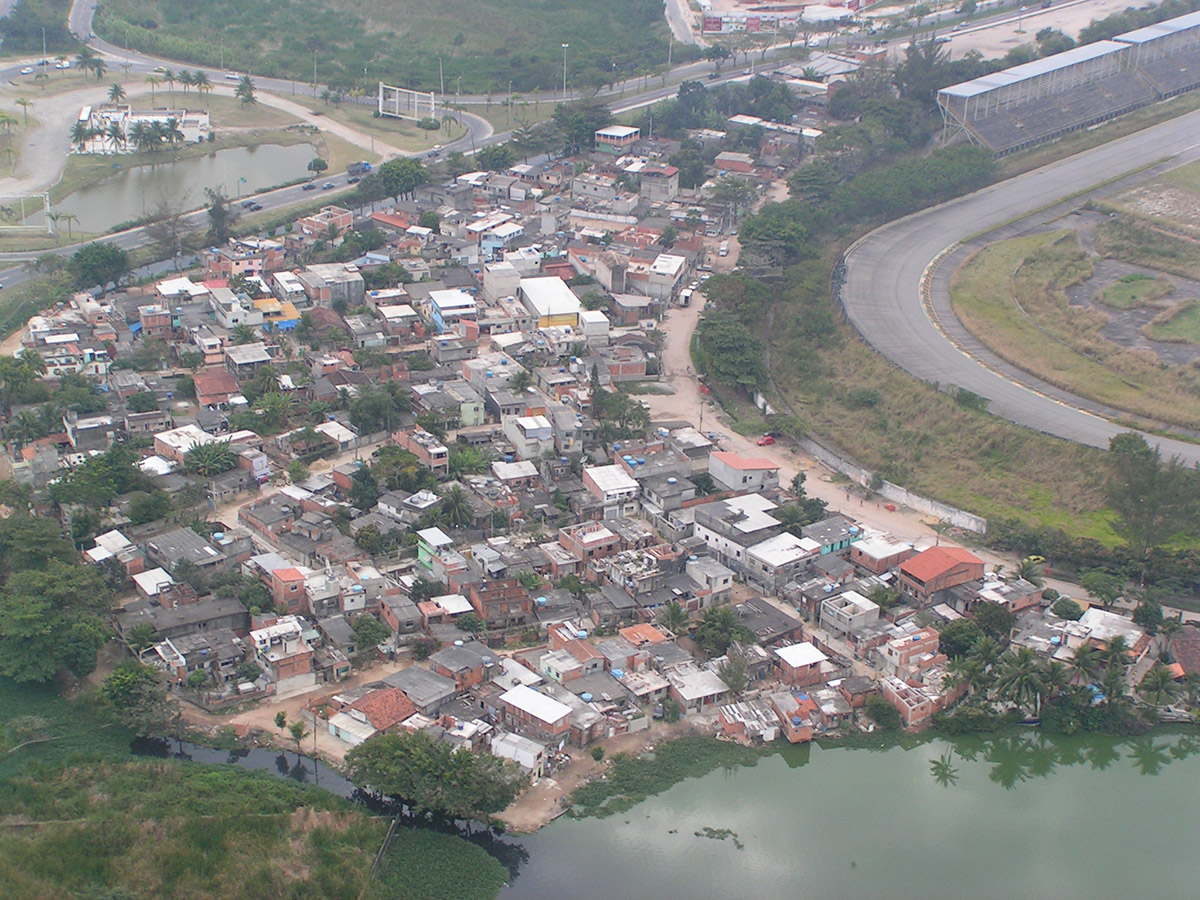
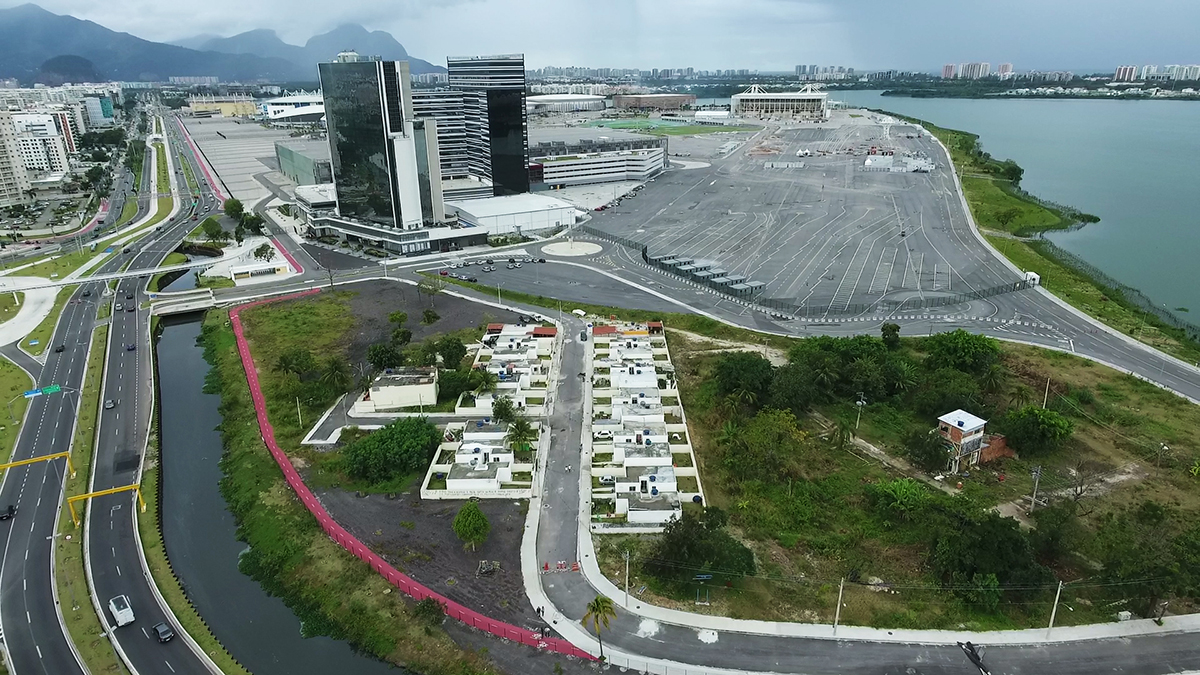
Fig 2 e 3. Aerial photos Vila Autódromo before and after the removals. Photos: Claudio Silva e Jimmy Mercier.
I. The Extended Family: Care as a Tool and Being Formed By Struggle
Mario – I would like you to talk a little bit about how this whole process of removal happened via the municipal government city of Rio, the impact of the arrival of a mega event such as the Olympics, in short, everything that brought about the process of removal to this community.
Luiz – I mean, the community was always threatened by real estate speculation, its location in a valued area, but with the Olympics the removal was authorized. We know very well that the reason was not the Olympics itself, but the real estate speculation that lies behind it.
Penha – With the Olympics came the money to remove us!
Mario – The money to remove you, but you managed to defeat the Olympics. How did you deal with this?
Penha – It’s a unique thought: I wanted my right to be respected. For me, that was fundamental. I understand it this way, if it’s a right then I should not even have fight for it. Automatically it should be respected, but from the moment someone does not want to respect it I have to make it respected. I think our poor population, the favelados [people from favelas], the real workers, have to have that awareness. That their rights have to be respected and are priceless. Because when we fight for our rights to be respected, people who have the money wanted to buy them. And you can’t. Because rights are not sold, right are won. Are they not? It’s the same with happiness, no one is completely happy if one has not fought to achieve happiness. You are only happy when you achieve something.
Mario – Luiz, we realize that between you, Penha and Natalia, there is a lot of care, but we also understand that there is a kind of extended family to the extent that your house has become an important center in the struggle of the families of the Vila Autódromo community against the process of removal. Today I heard you say that Luiza, who is here filming us, is like a daughter to you. So you have a concept of family that involves other people beyond blood and family ties. How is that?
Luiz – Yes, indeed, in this struggle of resistance here in the Vila, several supporters arrived, we became acquainted with many of them and our house soon ended up being open to all those people who came from outside to support us. People who understood our struggle, the arbitrariness of public power, the cowardice we suffered – a legalized community being massacred in the name of the Olympics. And these people who arrived, we always treated with great affection, and that created a very affective relationship between us. That’s when the family grew. It grew and was very good. Today we have friends in various places in Rio and even outside, even in other countries.
Penha – Complementing this idea of Luiz, I wanted to say that we had two different moments in the Vila: a time when we lost many people, many families left, each one for their reasons, each one based on their concerns. And we felt abandoned because it was such a big loss for people who wanted to stay in this territory. But at the same time, there was another moment, the arrival of new supporters, like Luiza, like Larissa, in fact, like many who came here. Because, in this way, we had a great proof of love, it was wonderful this exchange, the solidarity of students, families, indeed all of those supporters who came. Today I usually say that they are the second family of Vila Autodromo, because when they arrived our house opened up. To a certain extent, this took away our privacy, because our house was no longer just our home in order to become a home for everyone, to become part of the history of the Vila, together with our family and together with this group that came to support us, that was beautiful! We put ourselves in the place of the other, and the supporters who came, and who continue to come to this day, have this exchange of love. They bring and take, so I think this is living to share, this is key. We share the bread on the table, we share the word and the struggle, we share the embrace, the affection and this makes us resist. It makes us strong.
Izabela – I remember Penha, in the discussion that took place at the Hélio Oiticica Municipal Art Center,8 that you spoke with great respect for the families who left in the midst of the struggle, who did not resist. You said you welcomed them when they came to visit and that many of them missed life in Vila Autodromo, even though they had received money to rebuild their homes elsewhere. You never condemned them for leaving, and I think there is an important lesson in this, at a time when we have a great fragmentation, the separation of groups that are often fighting for the same cause, for the same rights.
Penha– It’s fundamental to have this understanding as not every family is the same. I was fortunate to have a family that managed to maintain a true unity. We knew what we wanted. Luiz, Natalia, my mother Antonia and myself; we knew what we wanted. And before we got into this whole thing, we sat down and said to each other: shall we go to the end no matter what? “We are ready” we said, but there is one important thing: “we have to be united.” In the same love, in the same joy, in the same peace, and that nothing of this struggle should take our best. Because our best nobody can take that.
Mario – Luiz, at the beginning of our conversation, when the tape recorder was not turned on yet, you said that you had also started to take care of the supporters, besides being taken care of by them. How did this influence the struggle?
Luiz – It was fundamental. I tell you! For me, I began to fight and soon my protest began to turn into a form of thanks to all those people who came from the outside to help. Because, boy, you see a person who came from Campo Grande, came from Niterói, and from so many places in Rio de Janeiro, to come here to support this struggle. I had to respect that. I have the greatest affection for everyone. Take a look at the care of these people! I was talking to people – “Damn, you could be on the beach now. You could be watching a movie, but you’re walking here in the rubble! Promoting art here with us. Making a theater here, showing a film. Wow, that for me is priceless, you know?” And that’s how we went about adding value, creating knowledge, and it’s been growing ever since. The exchange is incredible. And all of them say that they learn a lot here with us, and we find ourselves wanting to know what they were learning. “Man, we learn a lot here. We leave refreshed, it’s amazing to come here. You give us an incredible energy!” And we didn’t really know what we were teaching these people. We were fighting for our house, fighting for the ground to which we have a right, a right that was not being respected. But it’s good that they learned something, isn’t it?
Izabela – It’s interesting to think of this journey from the personal and private struggle for the right to housing to a dimension of collective struggle. And how this expands from one family unit to, for example, embrace Luiza as a daughter of the family.
Penha– I think it’s interesting that when we leave our private world, when people get out of their daily lives and open up space, we begin to realize that working collectively is much better. I think this. We leave our comfort zone, as Luiza came out of her comfort zone, and I left mine. This is very rich because this is a priceless exchange. We are here, today is Saturday, you could be in your home resting, so could I, so could she. But we’re here talking about things, and each of us will come out for the better. Because when we share these encounters, we gain a lot. And that’s critical to me, to you, and I think that’s what makes the difference. We opened the doors and went to look for a horizon, where nobody knew anything. And we were obliged to go through this horizon because there was a threat. We didn’t go there of our own free will. In this quest for respect, we lost some families, but we gained other families as well. And this was how we learned a lot to work collectively, which is super important.
Luiza – I think this is the lesson learned by those who encounter the families in Vila Autódromo, you know? It is this sense of community that they have, this sense of collectivity. And this has revealed to me some of the problems I have in relation to my own community. Today, for example, we arrived before them and were greeted by a neighbor. If I had made a plan to meet people at my house and arrived late, my neighbor would not receive my visitors as Sandra has received visitors for Penha. You know, I do not have this exchange. I even know my neighbors. I’m not that distant. But this way of life reveals the problems that we have in society and that here they do not have. In fact, they are creators of solutions. This family here, who became an emblematic family in Vila Autódromo, Penha, Luiz and Natalia, I learned a lot from them, with this relationship between mother and daughter, daughter and father. I think this learning has also changed my own family relationships.
Penha – It’s important to go back a little bit and also say that our family already was engaged in social work inside this community, before the removals. Luiz, for example, developed a project for children. We worked with the church and held catechetical education meetings in our house.
Mario – And the playground, was it you who did that?
Luiz – We created the playground via donations of toys and, together, in community gatherings, we set it up. I am a physical education teacher, so I started to develop a soccer project for boys and girls, we had a tournament with awards, festivities and walks … I took a child to Sugar Loaf and to Maracanã, to get to know Marapendi Reserve and via boat visit the island of Gigóia, Barra da Tijuca.
Penha – Because often the children don’t get to go anywhere outside of the community. And Luiz thought it was important to take the children to see the city, to get to know other things. There was a 12 or 13 year old child here who had never been to a beach. Imagine! And the beach is free and it is here. But sometimes the father and mother don’t have this concern, this care. So care was already being worked on within the community. Because the community is a big family, so we already have this natural care, indeed I usually say that care, well it’s natural …
Izabela– But what do you mean by “natural”? What is seen, for example, in Luiza’s account, is just the opposite.
Penha – Natural, in the sense of the day-to-day. The natural way, when you live in a community, for example. Care already begins in our house. We need to take care of the cleaning, everyday care. It’s already a natural thing. Women, for example, are already concerned about this kind of care, washing clothes, cleaning the house etc. Imagine if we didn’t do any of this, this is care. It is an art, which, at the same time, is care and a job. And within the community, within the favela, we have this great care enlarged, so to speak. Because the community, the neighbor cares about the other, the child of the other, the animal of the other. Sometimes the neighbor goes to work and asks – “will you keep an eye out, give some water to my animal.” We have these exchanges, this sharing.
Izabela – What fascinates me and excites me a lot is to realize, from the reports I have heard today and on other occasions, it is the way in which care emerges as a method, as a way of struggle, in a context like this, which is under threat of violence, of withdrawal of rights, of scarcity. Care resurfaces as a fundamental instrument and the struggle, as you yourself said Penha, as something that forms a new consciousness within you, beyond the awareness of your rights. Care as an instrument of a political struggle, and at the same time as a transformation of one’s subjectivity. The struggle as care, care of oneself, care of the other, care of the collective, care with the ground that one steps on…
Penha – With animals…
Mario – With plants… I know that you Luiz have been replanting here in the region. How would you describe your care in relation to the surrounding space, the environment, care of animals, of plants etc. How do you work on that? Was this an important part of your struggle?
Luiz– Oh, yes, it was very important! Because we had people here from various fields, including people who work with reforestation, who helped us with the community garden, people who came from the Oswaldo Cruz Foundation. This adds value, passes on knowledge, and you begin to see the importance of everything.
Izabela – We are here under the shade of an Atemóia tree, over there we saw an Araçá tree loaded with fruit. Even though the area of the Vila land has been reduced to a minimum, this care already exists, or is maintained because of that care. We are here with a puppy that came from Sandra’s house, whose story is totally linked to the removals, the destruction of houses and the departure of families … many animals have nowhere to go.
Luiz – This little dog is Onyx. All of them are fruit of the removals. These trees you noted, most of them are survivors, because in the end we do not let them demolish anymore. It was no longer proper to cut down the trees. So we were able to preserve some, we even removed an avocado tree with the help of the municipality; the same ones that had previously been demolishing our houses. The avocado tree is now in front of the church, it took a long time to bud, but green leaves are starting to form. I mean, I think we saved a tree. The coconut tree did not make it.
Mario – And this care expands from your house into space.
Izabela – And so the family grows.
Mario – And the struggle grows!
Izabela – And the struggle grows with the family and each individual also grows individually.
Penha – That was the importance of the struggle, because normally we, the favelados and the poor, who live in low income communities, don’t have an idea of our rights. And we live immersed in our day-to-day survival, to survive and maintain our home, and everything is very difficult. So we don’t have time to reflect on our rights, about how to exercise them, and we were very aware of this in the struggle, when infringed upon our living environment, our house that is the center of our life. Because we all have the right to housing, we all came here so we could have place to live. To have a space, to occupy some place. And this struggle has made a difference, showing us what our rights are, how we can fight for them. And we started struggling inside our homes, only this began to open up, opening up, taking on a dimension that we had no notion of how it would end, because the struggle was very arduous. We had to work, we had to fight for housing, and we had to keep our family together, which was fundamental! And in the midst of this difficulty we all began to realize that we were not just fighting for our house. I am fighting for my neighbor’s house, fighting for my territory, for my community, for my city, for my country. That way, the fight transforms me, I think the fight for Vila Autódromo did this with us, transformed us. And this family bond between us increased.
Izabela – And care as an instrument of this transformation, of this learning?
Penha – Care is part of it from my point of view. It is part of a set of things that you have to have: patience, you have to have love, you have to know how to dialogue, to know how to listen. And this is all of a piece, the know-how to welcome. But in this care, one thing is still missing. The greater care, which is the care of the Father, of God. And this is fundamental, faith! Along with this care, you have to have faith. For us, the love of the Father is part of this care. And seeking this care from Him is also fundamental, in my point of view. Because I think it brings a kind of closure, care in all its fullness.
Mario – But, Penha, I realize in the relationship you have with the sacred and with the divine, that there is one thing … that one could say … is not about waiting for the sacred. You fight concretely. I mean there’s no passive stance there.
Penha – This is important to speak about because people confuse religion with individual faith. Each one of us chooses our own religion. For me, true faith is that you believe that there is a God. But even so, the Creator himself, when he left us on this earth, did not give us our food fully prepared. He gave us the seed to be planted so that it could be then harvested as food. And it’s wonderful because we plant and eat. But then, He gives strength. He gives grace. He gives wisdom. Now we have to put our hands in the dough. If we want to beat public power, in this case, the municipal government, we have to work. If I stayed at home, waiting – “Oh Jesus! Come help me!” This is not how it works. If you do not go to the fight, nothing will be done.
Luiz – But you have to know how to wait …
Penha – Breathing, right?
Luiz -Wait! [T.N Luiz in Portuguese says “Esperar!” which rhymes with “respirar” meaning to breathe as just cited by Penha. Esperar also means both to wait and to hope. This interplay of meanings and actions of hoping/waiting are part of the subsequent dialogue.]
Izabela – Does waiting have to do with care?
Luiz– Yes, with patience.
Mario – And then we came back to this articulation of waiting and hope, but it is not a passive waiting or hope, it is not stopped in time. It is waiting/hoping in motion, as Paulo Freire said. Active hoping, powerful hoping, is not it? Those who stand still, do not win. You will go nowhere.
Penha – It’s a waiting/hoping that is like this, in the moment.
Luiz – It’s a strategy indeed. It’s an active waiting/hoping. Knowing the moment to act, facing the situation and knowing how to act at the right time.
II. Losing Fear or Toward Another Concept of Dignity
Penha – One of the things that is very present amongst the poor, the favelado, is fear. We are very afraid, we have a mania to be afraid, and I always fight against this fear. I always try to think: “no, fear does not exist” … of course, sometimes we are human beings and we are afraid. But if you feed that fear, your power is reduced. We spend so much of our lives bound up in having to earn money, to have to go to work … you cannot do without bread for your children, you cannot do without the money to send them to school, you need to buy bus tickets, and every cent is accounted for. Today, things have improved a little bit, in the old days it was much worse. So the poor live in the function of improving, we are always struggling to improve. And in this struggle for improvement, we forget ourselves: Of understanding, of knowing, of going to school, of knowing our rights, and often even our obligations. We know that you have to pay, but it seems like it all becomes a single obligation: you have to pay! You have to pay for everything! Now in all this where are our rights? How do we claim our rights? How do we safeguard our memory? How do we ensure that we have tools to fight when there is a violation of the government, wanting to remove our community because of the Olympics? We had no idea of any of this before starting this fight, here on this path that you walk without knowing where you are going. And everything that goes on around you becomes a tool for the struggle. You end up looking for this in everything, reinventing yourself, looking for strength and, thank God, there’s a good thing in all this. We discover that there is solidarity, that there are brothers, that there are still many good people.
Izabela – Was it this then Penha that you learned from the struggle, not to fear? Where the struggle for survival, which oppresses, is transformed into the struggle for life that in turn today frees you? Because there is recognition of a transformation within you when you say: “We were formed by the struggle,” I mean you’ll never be the same again. There is a change of life, of a way of life. So the processes of survival and work are figured out differently. I think that it is at this juncture, in the possibility of inventing other ways of life, of other ways of being, where activism and art coincide as forces of social transformation.
Penha – I think so, because the work, it’s important, but in general it’s a struggle where you only think of yourself, I think that here is where things shift a little, because we live to work, live a lot thinking about having, having, having and it is an empty having, do you know what I mean? We are so desperate to have something, that we are empty. And then, I, Maria da Penha, found much more sense for my life, working and searching, within a group, working in the collective, understanding better the importance of a struggle, of resistance, of spaces for housing and of their occupation. I came to see that many of the things I did were sometimes futile. There was no reason. The reason why is much clearer now, today I know the why of my being here. Because I had to work together in order to survive better with my neighbor, with my family. Where will I go? How far will I go? It’s a job and a process of caring that helps us to change. Work with more care; where we work with less concern about having objects, and focus more on having wisdom to deal with the other, with the other who often needs more than you, even if we do not have that much. So I guess care is that this work that you go on modifying and releasing what is often stuck inside of you. I wanted to do what I’m doing today, but I could not see it before, I had no way of knowing. And the struggle, it has transformed me, forced me to put my abilities out there. I speak. And so, when you speak, you change and start having other theories.
Luiz – And pass on concepts and values as well.
Penha – Yes! Because when you are at the mercy of something, when you begin to be afraid of that, you begin to lose yourself, to lose who you are. And one important thing that I learned from my grandmother9 is that we have to have words; to have personality and to face things head on. If you look at things as they are, you can survive it. Now if you step back, you get scared, that fear “ah, I will not be able to” … The struggle here in the Vila was very much this for me, particularly. I went back to my roots, to my grandmother’s. My grandmother said that fear was the weapon of the weak. My grandmother always told me that. In the fight I saw a lot of this. Because when you become afraid, you fail, you are at the mercy of something that is to come. And when you say – “No! Something’s coming, but I’m going to face that something. It does not matter what’s coming.” You get stronger.
Mario – Fear really blocks the future. It destroys the possibility of the future.
Penha – Exactly!
Mario – So fear has this power, and this is a something that is possible to observe, because often many groups produce fear about other groups. Social groups that produce fear in others. And with that, too, they produce paralysis, impotence as you said.
Izabela – You seem to have conquered so many things in this struggle, far beyond the right to remain in this territory, to have your house preserved…
Penha – I think that I have conquered what is the most difficult, in fact, which is to affirm my will, to keep my word, because today there’s too little of this. People do not keep their word. They do not affirm their will. Many times, right here on this earth, people thought, when I said I wanted to stay, that I was bluffing, that I wanted to be offered more money to accept the removal, to leave. The municipal government and those responsible for the Olympics had already put a value on my house of two million four hundred thousand reais [T.N approximately $1US dollar = R$4 Brazilian reais]. People thought maybe I wanted five million, not just two. You see? At bottom there’s a very serious problem at the root of our country. It is so dirty, polluted, with capital, with money, with power, with wanting more, that people sell for very little, or are always corrupted by something. My vote is worth dentures, a glass of cachaça. I sell my vote for a glass of wine, for a bottle of beer. And we have to work hard to get out of this mode in our country. So I think this is my achievement. I have earned the right to claim that not everyone has a price, that I have no price. I am not for sale. My right is not for sale. I think, in my view, that’s the most valuable thing I achieved. And with that I show that we are able to overcome this rotten public power. If we take our words at face value, but with fidelity to our will and struggle for this to be done, then we will have dignity. The government, the city hall, came here saying that we had to leave because there was no dignity here. And in my view, we have dignity when we want and we know what we want. That is dignity in my view. And I think that’s what we got.
Izabela – Penha, you have drawn a very complex concept of dignity, philosophical even. This dignity of which you speak does not necessarily have to do with the increase of life’s material structure. Because, certainly, this house that you live in now, built by the municipal government – the same style for all the residents who have resisted the removals – that little by little you are making your own, is not better than the house that you had. But that does not seem to matter, because dignity, according to you, is an awareness of your rights and desires, and the possibility of fighting for them … that is very beautiful. It is revolutionary.
Penha – People think that dignity is living on a paved street … Dignity is when you know what you want. In my view, it is struggling. It is enlightenment. Here the whole comes together. Along with this dignity comes a special thing too, which is the faith to believe in the impossible. Because what we did here was the impossible …
III. Museum of Removals (Museum as a Tool of Struggle and Preservation of Memory)
Izabela – And the Museum of Removals in this context? Why start a museum? Why did you think the museum was an important tool?
Mario – Maybe I should say here that the museum was launched on May 18, 2016. It was raining, a light rain, but there was a ton of people. Thainã de Medeiros was an important articulator and Diana Bogado, together with architecture students, coordinated the creation of seven sculptural installations from the rubble. At that time, the museum played a very large role in denouncing the removals. In 2016 the International Council of Museums had suggested that the year’s theme would be: “Museum and Cultural Landscape”. Thus, the Museum of Removals was launched saying: who most destroys the cultural landscape is public power and mega-developments. Real estate speculation, mega-events and mega-entrepreneurs, this is what destroys the cultural landscape. While here in Vila Autodromo the landscape was being rebuilt daily, being preserved. I would like you to talk a little about this, because in the process I realized that what had started as a denouncement began to be rather an announcement, as if the museum made all this public in a new way by denouncing it and at the same time, announcing a new possibility for the future.
Luiza – The creation of the Museum of Removals happened about two months after the demolition of Penha’s house and of the Residents’ Association.
Penha – Luiza, I do not know if this ever went through your mind at that time, if you and the other supporters had the feeling that it seemed like a worthless attempt, it seemed like nothing was going to happen.
Luiza – Yes. These two demolitions were very symbolic, but I never gave up hope. It seemed like we were in a football game where you had to score 4 goals with 10 minutes to go! The most realistic scenario was that of defeat. But that’s it. You had to stop believing in realism. This was very clear, many people came here and Penha and Luiz encouraged them. So, when the house of Penha was taken down, it was a blow.
Penha – People asked: where does this force come from? It’s in simplicity. If you ask me where it came from, I’d say it came from the earth. Many times I saw a small plant sprout on the dry ground and the force came. It is because the Lord is wonderful. He gives you signs. If you quiet down and seek, in simplicity, strength comes. So, often I saw my hope, my dignity in that plant that grew even in that terrible earth, in the rubble. When we were very discouraged, a group came, which strengthened us. And I remember well the group of the State Environmental Institute – INEA, was a group that marked me. I was very down, because there’s a time when we don’t have energy, I did not even want to make food. It seemed that there was only defeat ahead, only defeat … Then they came with energy and spent two days here and suggested to make a collective meal. Guys, that was so wonderful! Because I saw in each young person, hope sprouting. I used to say this: “Guys, I’m not alone. People are coming, more people are coming!” And that renewed me and I began to see things with different eyes. It was a very gratifying to see that there is still so much love. Because it’s when you come out of your comfort zone that you bring forth hope, even without knowing it, you make a difference by moving forward with hope in such a simple way, this is love.
Izabela – Penha, you just did with love, what you did with dignity, in giving us a tour of the concept of love. Because this love that you speak of, is collective. It is not a love that I have, that you have inside you. It is a love that is created here among us, in this collective and public space.
Penha – It’s a love that can transform us. And I always say that this struggle was for love. I did not fight to fight. I did not struggle because of a desire to struggle. I did not fight to hurt someone, even though I was injured, they broke my nose.10 This kind of struggle is very different. I fought with the care not to hurt myself or hurt anyone, even in the use of words. Because we don’t just get hurt, hitting one another, like they hurt me. I could have ended up distressed because they broke my nose. My nose got fixed. It looks even better! This is love. This is living. That is dignity. You do not dwell on small things. These pass.
Luiz – In my opinion, the importance of the museum is that history will not be lost. We usually say that the Brazilians have short memories, don’t we? And in about 2, 3, or 4 years, Vila Autodromo was not going to be remembered anymore. People would have said: Vila Autodromo, I don’t remember, isn’t that somewhere in Jacarepaguá … And with the museum no, it has a record of our struggle. It safeguards the details of the history of what the Vila was like prior to the removals, from social relationships and companionship to that thing of helping the other. And this will stay. Because we have a record of this, we have videos, photos, and documentaries. And the museum rescued it all. So if we move from here, we know that the history of the Vila will stay, will perpetuate. That it will be there for anyone who wants to seek it out, investigate or research it.
Penha – For me the museum has another fundamental dimension, besides protecting the history of the community. For me it became a tool of struggle. The museum stopped being just the museum and became a tool. This is what is fundamental; it became a tool against the removals. And I think the museum will continue to seek out this voice, so that it has a voice, so it can say no, really say no to the removals. Enough, it’s enough. Wherever the museum goes it will say: “This is not going to be removed because these families need to tell their story.” You cannot remove memory. This is the motto of the museum.
Izabela – It’s curious to hear you talking about the museum in the third person, the care the museum has and had. But you are the museum!
Luiz – Yes we’re talking about ourselves. This is the great thing about the Museum of Removals.
Izabela – You are talking about the struggle and the care that you yourselves are putting into the work of building the museum understood as a tool of struggle and preservation of memory.
Mario – Because it is a museum that is born of care and produces care. Both, at the same time.
Penha – And the Museum also brought knowledge to this community. For example, I work as a hired housekeeper. I did not even finish second grade, what would be today’s high school, so I am a very much a lay person. And so, I did not understand what a museum was, for example. In my understanding, the museum was a place where a lot of old stuff was kept. I had no notion that the museum was a science, that it could be a tool of struggle, within a housing struggle. That it can transform, teach and lead you. Even without you having studied, you can learn other cultural things there. The museum is cultural. It shows you the importance of issues and values you did not have before. So it has been restorative in the history of our housing resistance. We are inside a fighting tool that came out of the rubble, of that heavy context. At a time when we were going through so much difficulty, the Museum of Removals was born with strength, with joy. It is not a dead thing. It is a thing full of life, of hope. So, I think it’s restorative. The Museum of Removals renews and teaches that one can fight with wisdom, with art, with better knowledge. So for me, it was very refreshing.
Izabela – And in terms of museology it is a very innovative museum concept. This interview, for example, is being recorded and filmed in the backyard of your house, in other words, today is Saturday and we are working in the museum! I understand that the museum is also not only a work of yours, but of the whole community. It is a project constructed together with the work you have been doing to produce and ensure your survival. Because you, Luiz, are still teaching, your daughter is still working on other things. But here you started a new job, for example, that of receiving us here in the Museum, of articulating collaborations with other institutions such as the Goethe Institute, the INEA and the Universities, as well as speaking publicly talk about what the Museum is and about the struggle you have won.
Penha – Yes. Right now I don’t even work outside of here. In fact, in 2014, I stopped working. There came a time, in the middle of the removals, that I really had to stop working outside of here because it was difficult …
Luiz – The struggle took a lot of people.
Penha – We needed to be very active. We had to be present and my mother also got sick, and things got worse. I, in particular, had to stop working in other family homes outside of here both for the struggle and for my mother.
Luiz – The struggle affects a lot more than one family home, for example, we were here keeping vigil, not sleeping. When Penha worked in another people’s houses, she came home and slept, rested. In the struggle, there were days when she did not sleep, as there were other demands besides survival.
IV. Collaboration, Sense of Collectivity and Love as the Basis for a New Democracy
Penha – Let’s talk about this backyard, this museum that we are in…
Luiz – There’s a story here.
Penha – This territory here. This land, this backyard, belonged to another family. It was Dona Dora’s house [T.N Dona is a term of respect for older women]. Dona Dora passed away and this land passed to her children and they wanted to sell it. As we were part of the church we had the dream of buying this land to enlarge the church behind us. But in the way things go, it came about during that difficult period of removal. The family negotiated with the city, received money for the expropriation of the land, Dora’s children left, and that land was empty. And we succeeded, with a lot of struggle to get this land, now we own this terrain. Look at the history of this land! It’s a living museum, is not it? From Dona Dora’s memory to her children and now to Dona Antonia, my mother, and myself, Natalia and Luiz. So you’re in an already museological space that is under construction, and that’s the key point. This construction will give us a new vision in the future and new hopes, at the same time, creating hope and being made with a spirit full of hope. The word is hope. The hope to see a museum one day say: no more removals! Enough! We will respect the history of these favelas, we will respect the history of these communities, we will respect the people, we will be democratic. I think the museum is being built to show that democracy does not yet exist, but that it is moving, it is growing. It’s a job for ants, a collective job. I think it is fundamental to talk about the importance of society embracing these social causes. Mario did this beautiful job of helping us to found this museum, and I say this not because I’m in front of you! I honestly think so. It is the truth and it has to be said. When you arrived in this community you made a difference.
Luiz – It broke taboos. And added values too!
Penha – Exactly, showing us that we also have the capacity to learn. What you do is bring your knowledge to those who do not. It made us learn in a different way. We learned a lot. And this is fundamental. We need to have more teachers like that. We must have more priests, like Father Fábio. This is what democracy is, that is what it is to have equal rights for all. This makes the difference, when you leave your comfort zone and come here to do this talk with us, when you are careful to give voice to the work of a simple person. This is democracy from my point of view. This shows us that we are evolving into a democracy and that we can do things differently. And that many changes will come. A new democracy.
Mario – Penha, I do no more than my duty, I think this is my obligation. So, in fact I came here to share. Because as the supporters say, I also leave here renewed. Your speech, your intelligence, your action is refreshing. It inspires me.
Izabela – It seems to me that in the work of people like Mario, and of other collaborators, here with you, it is not a question of bringing culture to those who do not have it, quite the opposite. I think perhaps the greatest work that can be done by this museum was to help you realize how powerful you are. The good call here, in my view, was in seeing how you could appropriate the museum as a tool. When you say: “the museum took care of our memory,” you recognize the value in your history, in your strength. So it’s pretty much what Mario said very straightforwardly. That the museum, more than knowing what you did not know, was a way to recognize and value what you already had and knew as something really important. Mario, opened up these possibilities, and it is very beautiful to see this mutual recognition, because you come from very different places and you both knew how to value the potential of each one…
Penha – It’s an exchange! And only this exchange is capable of producing these opportunities in our world of capital, where people only live thinking that it is best to be inside an air conditioned apartment, inside a mall, buying, buying, buying what you do not even need. You forget to experience the best of the other human being…
Mario – This is what it means to have encounters, to coexist, to share … But, Luiz, I’d like you to talk a little about the photographic collection that you have been organizing about the Vila Autódromo struggles which is part of the Museum of Removals collection. I think we can talk about this ongoing process, similar to how the filming we are doing today will also become part of the museum’s collection. How did you get started and how did you move in that direction?
Luiz – Yeah, I always liked to take photographs. I first started shooting on the tours with the children and realized that I really liked taking pictures, printing them and organizing albums. Over time I recorded things in the Vila that I thought were important, the parties. We had here on October 12, Children’s Day, a full-day party with a very intense schedule that involved the whole community. Then I also realized that this thing of photographing was also a way of keeping records. Because I’ve seen a lot of things destroyed, spoiled. And I was worried about that. I thought: “Soon nobody will remember this house, this wall here, this space. What was here? No one will know!” As the threats increased and we began the traumatic processes of removal, the arrival of the tractors, the municipal government staff knocking on the door, threatening the residents, broken water pipes, the city removing the light poles – we were without public lighting! So I saw the need to register this as a weapon in our favor. The mayor preached a lot in the media: whoever wants to leave can do so and who does not want to leave can stay and we will urbanize. But here we were getting the hell kicked out of us. Photography became a tool of defense.
Izabela – When I heard you speak, I was thinking that just as the museum becomes a tool, photography also becomes a tool of struggle and care.
Luiz – Care and self-defense, yes, so that you can talk and have something to prove what you are saying.
Izabela – Yes, there’s also that question, of being a record that has to do with the law, with a legal question.
Luiz – This all went to the media, a clip, phrases, factual explanations, many videos as well.
Izabela – The Museum of Removals recently donated part of its collection, material from the destroyed houses, to the National Historical Museum. How do you see this action? The Museum of Removals is an open-air museum, made up of several houses. It does not have a space dedicated exclusively to its activities, which may come one day if you feel this need, but rather is a museum that has a collection. How do you see this gesture of gathering pieces of memory and donating to another museum? How do you understand this other museum as a tool? Because it seems to me that that museum changes when it receives your material, it is no longer a mausoleum, a place to keep something old, as you said Penha. The Museum of Removals poses very serious questions for the National Historical Museum and for all the museums, as I see it.
Penha – I think, that upon receiving our collection that the museum became more democratic. Why had it not been set up to receive a collection like ours? But history evolves and renews itself and it is interesting that the museum today could receive the remains of this destroyed community, which has no value for capitalists. I find it very interesting how this change is happening, this transfiguration that goes on over time and how we can modify our country, our history, our day-to-day life, I think that is fundamental.
Mario – Part of her house is there!
Penha – Yes, I never imagined this. Look how interesting things are! For this reason I think the care that this museum brings is important. It will take care of something I never imagined, right? But at the same time, who created that museum never intended to safeguard the remains of a house of a cleaning lady, a day laborer. So the care of the art of a museum is transformative. This is transformative.
Izabela – But Penha, you do understand that it was that you, Luiz, and the collaborators that made it possible?
Penha – Yes!
Mario – It is also important to note here that the staff of the National Historical Museum and its director had the sensitivity to welcome this museum, as it transforms the National Historical Museum that was created to safeguard the collections of Brazilian oligarchies, large families, noble families.
Luiz – And there we are today!
Izabela – Today there is the nobility of Vila Autodromo. The nobility of a struggle. This is very important.
Penha – This is called democracy, we started a democracy. We started getting our rights respected. This action says: it is possible. When you claim your rights, when you do not let corruption take hold, it changes things. We made a difference. And in making that difference we see this power of transformation. Our collection is there by right, and there should be collections of other communities as well. If someone had made the difference back then…
Izabela – Listening to you, it’s becoming clearer and clearer to me what people come to learn here, complementing what Luiza said about the communitarian and collective spirit that she has learned here, and drawing on what you said Penha, about this new democracy. Here there is this way of life that is a patrimony, a shared way of life that is born in the favelas, that is born in the peripheral zones and, to a certain extent, with their differences, in all communities in which life is linked to movements of struggle and resistance. It is a way of life that seems to point to a possible future, sustainable in economic, political and social terms. There is a knowledge produced by you in this way of life that is a fundamental patrimony for the transformation of Brazil, to build the society that we want.
Mario – And this is related to what is already called living well, the idea that developmentalism is not possible at full steam and forever. That this is going to explode. What is needed is to create an alternative to development, another way. And what you’re pointing toward here is just that. And this, as Luiza says, is an alternative, a partnership, a sharing, a social reforestation, and a social ecology, an ecology of knowledge as the Boaventura Souza Santos would say.11
Penha – It is a life lived in truth, which includes the loss of fear, which I think is fundamental. It is life lived truly, a life of love. Because I trust you, even though I do not know where you’re coming from, I know who you are. And it’s this difference that the Vila wants to live; the Vila wants to live this. A new democracy.
***
Izabela Pucu
Izabela is an artist, curator, researcher and cultural manager. She has a PhD in History and Art Criticism PPGAV / EBA / UFRJ. She was director and curator of the Hélio Oiticica Municipal Art Center (2014-2016) and coordinator of projects of the EAV Parque Lage (2008 to 2011). She was researcher for the book Mário Pedrosa: Primary Documents, eds. Gloria Ferreira and Paulo Herkenhoff (MoMA / NY, 2016) and edited the books Roberto Pontual: Obra crítica (City Hall of Rio / Azougue, 2013), Imediações: Wilson Coutinho (Funarte / Petrobrás, 2008) and was curator of exhibitions such as, Osmar Dillon: não objetos poéticos (2015), Ivan Henriques: Repaisagem and A lágrima é só o suor do cérebro featuring the work of the artist Gustavo Speridião (2016).
Luiz Claudio Silva
Luiz is a physical education teacher. Born and raised in the Rocinha favela and has lived in the Vila Autódromo community since 1994. In recent years he has had to learn to deal with the threats of forced official removals. He recorded almost everything concerning the threats both the community and individual resident were exposed to and built a gigantic archive. AS one of the members of the Museum of Removals he assists in the construction of the collection and welcomes visitors. He plays an active role in preserving the memory of Vila Autódromo.
Luiza de Andrade
Luiz is an audiovisual producer. She graduated in Cinema and Journalism from PUC-Rio and has a postgraduate degree in documentary cinema from the Film School of Barcelona (Ecib) and Cinematographic Production at the School of Cinema and Audiovisuals of Catalonia (Escac). She collaborates with the Museum of Removals on the management of cultural projects. She is also a founding partner of Mairarê Produções, a producer focused on projects with a positive socio-environmental impact.
Maria da Penha Macena
Maria da Penha is a community leader, and a reference in the struggle of the residents of Vila Autódromo for their rights to housing, specifically in relation to the policy of gentrification and removals imposed by the municipal government for the construction of the 2016 Olympic park in the west of Rio de Janeiro. On March 8, 2016, international women’s day, she received the medal of Woman Citizen of the Assembly Of the State of Rio de Janeiro, and, on the same day, was violently attacked by the police and had her house demolished. She is one of the founders of the Museum of Removals, which seeks to keep alive the history of the Vila Autódromo community and the legacy of its struggles.
Mário Chagas
Mário is a poet and museologist. He holds a PhD in social sciences from UERJ. His area of research focuses on social museology, museum education and the practices related to memory and patrimony. He is a professor in the School of Sociology and teaches in the Post-Graduate Program in Museology and Heritage at UNIRIO. He is coordinator of the Museum of the Republic and president of the International Movement for New Museology, an affiliate of the International Council of Museums. He participated in the creation of the National Museum Policy (2003) and the Brazilian Institute of Museums (IBRAM), among others. He is founder of the Brazilian Journal of Museums and Museology – MUSAS and creator of the Ibram Editorial Program.
_______
1 In the poem “O dia da criação” [The Day of Creation] (1946), by Vinícius de Morais, there is a series of sentences that follow each other: “At this moment there is a marriage / Because today is Saturday. There is a divorce and a rape. / Because today is Saturday / There is a rich man who kills / Because today is Saturday / There is incest and a regatta / Because today is Saturday / There is a gala show / Because today is Saturday. There is a woman being beaten and silenced / Because today is Saturday / There is a renewal of hope / Because today is Saturday … “. The poem is read by the poet himself in a video available [Portuguese only]: https://www.youtube.com/watch?v=jpfymRLaPaA. Accessed April 2018.
2 This object was made by the artist Guga Ferraz as part of the project Céu Aberto (Open Sky) developed in partnership with the Goethe Institute. For more information [Portuguese only]: https://www.goethe.de/ins/br/pt/kul/sup/mem/ciu/rio/21065482.html.
3 The dialogue presented here is edited from a two hour discussion with Maria da Penha, Luiz Claudio and Luiza.
4 According to Boaventura “(…) dis-imagine the social is to have an antisocial thought of the social.” It is, for example, to invest, in the name of mega developments and the voracity of captial, in cuts and limitations to human rights, the environment, rights to life, education, housing, memory and culture. Statement made on November 8th, 2017, when Boaventura de Sousa Santos was confered with an honorary doctorate. Available [Portuguese only]: http://www.sul-sur.com/2017/11/do-pronunciamento-de-boaventura-de.html. Accessed April 2018.
5 Idem.
6 Idem.
7 Idem.
8 The dialogue “Reside and Occupy as a Method” occurred on October 2nd, 2017, as part of the International Encounter Care as Method # 2. Other panelists in addition to Penha were: artist and doctor Ana Kemper, high school student Isabella Dias, poet and teacher Luiz Guilherme Barbosa, moderated by psychologist Eduardo Passos. On that same day there was also a dialogue between the artist Eleonora Fabião, the actor/theater director Geo Britto and the artist Millena Lízia. See the dialogues between Shona Macnaughton and Millena Lízia [http://institutomesa.org/revistamesa/edicoes/5/portfolio/shona-macnaughton-e-millena-lizia-en/?lang=en], Isabella Dias and Luiz Guilherme Barbosa [http://institutomesa.org/revistamesa/edicoes/5/portfolio/isabella-dias-e-luiz-guilherme-barbosa-en/?lang=en], the essay by Eleonora Fabião [http://institutomesa.org/revistamesa/edicoes/5/portfolio/eleonora-fabiao-produzir-estranheza-e-cuidar-azul-azul-azul-e-azul-en/?lang=en] and Eduardo Passos Glossary contribution [http://institutomesa.org/revistamesa/edicoes/5/glossario-en/?lang=en] in this publication.
9 “I was raised by a single mother and grandmother. In fact, I was raised more by my grandmother than my mother. As a baby I lived until I was six and a half years with my grandmother in Paraíba, in a house with a yard similar to this one. She was an incredible person who shaped all that I am,” Penha told us. When Penha came to Rio, as a child, she, her mother and grandmother lived in the Rocinha favela in São Conrado, but they dreamed of a more spacious place. She met Luiz in Rocinha – “I was 14 and he was 17” – they built their first home and had their daughter Natália. It was in Rocinha where her grandmother died. – “She did not have the chance to move to a better and bigger space as she had dreamed about so much here in Rio, but I did!” Then, at age 27, when Natália was six and a half, the same age when Penha had immigrated to Rio, they moved to Vila Autodromo. “I usually say that in Vila Autódromo we truly began our history. Here we began to make roots. To know what a story was, to make roots and that was it, that’s it.”
10 Dona Penha had her nose broken on June 3rd, 2015, when a group of residents gathered in front of a family home that was to be removed by decree of expropriation. “The family had not been notified previously and had to leave at that moment, which was absurd, since they had not prepared to move and had nowhere to go,” Natalia wrote to us during the process of editing this dialogue. “This day was intense and too tense,” Natalia continued, “there was mobilization from both the community and the supporters and the Public Defender, and although there was a previous dialogue about resolving the situation without truculence, the bailiff complied with the decision of the judge, ordering the municipal guard to enter the house by force, and so the guard did, violently attacking all who were there. In the middle of the conflict, Penha had her nose broken and other residents also suffered injuries.”
11 Boaventura de Sousa Santos. “Para além do pensamento abissal: das linhas globais a uma ecologia de saberes”. Available: [Portuguese only] http://www.scielo.br/scielo.php?script=sci_arttext&pid=S0101-33002007000300004.


